
LaNacion article June 2007
José Cura, the Return of the
Prodigal Son
One of the main items of interest
in the current classical music schedule of the city of Buenos Aires is
without a doubt the return of one of its prodigal sons, the Rosarino
tenor José Cura, after an eight year absence from the country. Living in
Europe for the past 16 years (currently in Spain), Cura’s name is
synonymous with success in portraying the dramatic characters of the
operatic repertoire, something which naturally turns him into one of the
most sought-after tenors in the world and one of the most popular
figures in his field. It also doesn’t hurt that on top of a phenomenal
voice, José Cura has an excellent physique for his type of role as well
as an exceptional professional foundation, which is both complete and
multi-faceted. The arrival in Buenos Aires of one of opera’s most
dazzling international opera stars puts the seal of the best in the
world of opera on the Teatro Colón’s season with a role that is
custom-made for him: the character of Samson in the Romantic-era opera
“Samson and Dalila”. Together with Cecilia Díaz and the cast, chorus and
orchestra of the Teatro Colón, the tenor will appear tomorrow evening at
8:30 in a concert version at the Coliseo.
The Titan of Opera
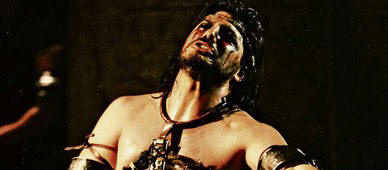 In
the fifteen years of his successful international career, José Cura has
frequented not only the most prestigious halls and theaters in the
classical music world (Met, Covent Garden, LaScala, Opera National in
Paris, Staatsoper in Vienna, Hamburg and Zurich, and the Deutsche Oper
in Berlin among others) but has also been present on remote stages, has
visited countries far removed from the traditional circuit, has
conquered exotic audiences as to opera and untiringly carried the art of
music and theater to inconceivable corners of the world. At his side
sing the most glamorous divas and direct the most celebrated conductors.
Parallel to his intense activity in the theater (as conductor, singer
and régisseur), he exploits his ample qualities as communicator and
showman with surprising ease, offering recitals and shows—some of them
on outdoor stages in front of thousands of people—in which he combines
singing with orchestral conducting (in an original format he himself
calls ‘half and half’), something that has earned him both the criticism
from the most conservative sectors of the music media and the admiration
of his fans, as well as an unusual popularity for an artist in the
classical genre. In
the fifteen years of his successful international career, José Cura has
frequented not only the most prestigious halls and theaters in the
classical music world (Met, Covent Garden, LaScala, Opera National in
Paris, Staatsoper in Vienna, Hamburg and Zurich, and the Deutsche Oper
in Berlin among others) but has also been present on remote stages, has
visited countries far removed from the traditional circuit, has
conquered exotic audiences as to opera and untiringly carried the art of
music and theater to inconceivable corners of the world. At his side
sing the most glamorous divas and direct the most celebrated conductors.
Parallel to his intense activity in the theater (as conductor, singer
and régisseur), he exploits his ample qualities as communicator and
showman with surprising ease, offering recitals and shows—some of them
on outdoor stages in front of thousands of people—in which he combines
singing with orchestral conducting (in an original format he himself
calls ‘half and half’), something that has earned him both the criticism
from the most conservative sectors of the music media and the admiration
of his fans, as well as an unusual popularity for an artist in the
classical genre.
When José Cura began to be
mentioned on the front pages of the music media of the world, the
legendary figure of Samson was among the first roles to be associated
with the name and image of the Argentine tenor. Not only the qualities
of the timbre and the character of his voice, but also the exuberance of
his personality, his charisma and imposing stage presence permitted him
to be proclaimed—along with other great characters that he portrays with
equal empathy such as Otello, Canio, Don Carlo and Turridu—the ideal
interpreter of the biblical hero for several generations.
Some years have elapsed since
then; quite to the contrary of what often happens with a career that
takes off too quickly and with excessive fanfare only to become
exhausted by the media frenzy, all the predictions that accompanied José
Cura’s spectacular international rise have come to fruition in a career
beyond measure. In the following interview, the tenor refers to
different interpretative aspects of the role of Samson.
---What does one do about the
voice with respect to the traditional classification for Samson?
---If one would like to interpret
Samson in the spirit which is strictly understood as stylized French
music, in a historic sense, we would have to start with a voice that I
would not say is light but one with much less attack. It is very
different to do the role as it was conceived in around 1890. If we want
to, on the other hand, perform a modern Samson in light of the acoustic
problems and issues that we live with, the difference in the conception
as to the vocal aspect is enormous. More than relegating the role to a
classification based on the number of decibels produced, I prefer to
think of it on the basis of psychological coloring which is (to
be sure) a determining factor in the profile of the character.
---What are those acoustic
problems?
---The size of the theater today
is enormous. Then, there is the fact that the orchestra sounds very loud
due to the harmonic density of the modern instruments. A third point,
(and) a more dramatic one, is the rise of the diapason. The
majority of the operas which we perform today were written between 1800
and 1900. During that period, the diapason oscillated between 432
and 435 cycles, which means that, when we compare it with the
diapason that we use today, which is almost at 445, even up to 450
cycles, we have an increase in the tone by a third, even up to a half
tone. In short, this has caused an important modification in how we sing
as compared to the past. The logic of these conditions causes the
vocalizing (singing) of certain dramatic characters to be awarded to
voices which are much stronger and more robust.
---With respect to the
tessitura in which Samson is written, it is for a dark and baritonal
tenor who sings most of the opera in the middle register (medio-grave).
How do you decide the delivery of the high notes over the orchestra and
chorus?
---With a high note that has much
density (spessore), that is broad and large. We are talking about
a mythological hero who bases his entire legend on his physical power;
therefore, it would be ridiculous for the character to sing these notes
with the same sound value as, for example, a high note of the tenor in
“La bohème”. The more beautiful and correct the sound is, the more it
lacks dramatic intensity. This is the great vocal challenge of Samson
and of all the roles of the dramatic tenor in general.
---What is your perception of the
character with respect to vocal brilliance?
---Samson has clearly defined
moments in which he is able to shine for very different reasons. In the
first act, he is aggressive, a warrior of the Old Testament. In the
second act, the aggression changes to sensuality and extreme insecurity
in relation with himself, with God and with the feminine. In the third
act, which is spiritually the most interesting, is where Samson
redefines himself. In the entire first part of this act, Samson ought
to sing media voce. In the second part this changes on the other
hand, and we have again another type of singing. It is the moment of
redemption understood within the framework of a culture that existed
1500 years before Christ. The possibilities to shine are extensive and
manifold.
---Does this role give you a
feeling of satisfaction?
---Very much so! Samson is one of
the roles that I am indebted to the most for really making me shine on
stage. He is one of the characters that have given me the greatest
satisfaction throughout of my career.
Translation: Monica B.

A
Conversation with José Cura
María
Josefina Bertossi
 When
José Cura came down punctually to the lobby to give us his final interview
before returning to Europe, I thought it was gracious of him not to have
canceled after the effort of the previous night’s concert when he sang while
suffering from an untimely cold (for a singer, a cold is always untimely).
Besides, it was a very cold 9 July (Rosarinos hardly remember when it was
really cold) and many expected snow. I will never forget when it snowed
in Rosario a few days before my entire family was involved in a car accident
and we saw the snow on the windows of the hospital, recalled the
Rosarino musician (singer, director, composer) who now lives in Madrid but
works in capital cities around the world. When
José Cura came down punctually to the lobby to give us his final interview
before returning to Europe, I thought it was gracious of him not to have
canceled after the effort of the previous night’s concert when he sang while
suffering from an untimely cold (for a singer, a cold is always untimely).
Besides, it was a very cold 9 July (Rosarinos hardly remember when it was
really cold) and many expected snow. I will never forget when it snowed
in Rosario a few days before my entire family was involved in a car accident
and we saw the snow on the windows of the hospital, recalled the
Rosarino musician (singer, director, composer) who now lives in Madrid but
works in capital cities around the world.
“Have you ever tried to pick a flower with a glove?”
was the first thing we heard from José Cura from the stage. The opening
question was an attempt to explain how it feels for a musician to sing with
a cold and, in addition, to share the recital and the respiratory affliction
with the pianist, Rosarino Eduardo Delgado, also ill with a cold.
The audience filled the auditorium of the Teatro
Fundación for the concert on 8 July, the main event of the 25th
anniversary of the Mozarteum of Rosario, which had been announced as a
program of chamber music, a difficult assignment considering the health (of
the artists) since this repertoire needs vocal subtleties, but we can attest
that the artist carried it off with experience that comes from the position,
interspersed with enjoyable and sincere comments.
“Last night I took a beating and this morning I rose
voiceless. Anyone who isn’t in this career has no idea of the significance
of singing with bronchitis. I did well and believe those who saw it liked
it,” Cura said with satisfaction.
There were those who hoped you would sing opera even
though chamber music had been announced.
The program said chamber music. I would love to do
all of my concerts this way. I do not enjoy singing arias in concerts
because opera in concert is monastic and the audience always expects me to
sing the same thing. Besides, opera cannot be done with just a piano and
for a concert as important as this anniversary it had to be a chamber
concert with piano.
The auditorium of a theater can be a good thermometer
to measure the relationship between an artist and the public, and it is
there that we listened as some talked about this singer. José Cura is the
full name of an international artist, but those who knew him in Rosario, in
Fisherton, and from childhood they have called him what they always called
him: José Luis.
José was designated by the exigencies of the program
space because José Luis is too long. Only in Rosario do they call me José
Luis.
The concert represented the world-wide release of
Sonetos, a work based on the verses of Pablo Neruda with music by José
Cura. The composer explained that once in a dressing room somebody left
him a book of poems by Neruda, which he fortuitously opened to the page of
the sonnet that begins “When I die, I want your hands on my eyes.”
The premiere was not assured, however, since
authorization from the heirs of the Chilean poet arrived only four days
earlier.
Here in Rosario we saw you and we listened to a singer,
composer and director. How difficult is it on the international level to
impose the role of director and composer on the figure known as a singer?
 I
never impose it. I propose. Those who like the proposal accept it, those
who do not, don’t. I conduct a lot and in very important locales such as
the Vienna Opera and when you direct the Wiener, you conduct one of the
significant orchestras in the world, the same is true in London with the
London Symphony. There is never this sort of question because when one
stands in front of the orchestra for the first three minutes the musicians
see the tenor but then no longer, because to move forward without a
professional musician [standing on the podium] would not be possible. The
preconception comes from the press, which does not understand and uses tenor
as a bad word. To say someone is a tenor is like saying that she is a woman
rather than a feminist, like referring to a stupid individual with no
rights. I
never impose it. I propose. Those who like the proposal accept it, those
who do not, don’t. I conduct a lot and in very important locales such as
the Vienna Opera and when you direct the Wiener, you conduct one of the
significant orchestras in the world, the same is true in London with the
London Symphony. There is never this sort of question because when one
stands in front of the orchestra for the first three minutes the musicians
see the tenor but then no longer, because to move forward without a
professional musician [standing on the podium] would not be possible. The
preconception comes from the press, which does not understand and uses tenor
as a bad word. To say someone is a tenor is like saying that she is a woman
rather than a feminist, like referring to a stupid individual with no
rights.
The buzz surrounding the concert was the announcement
of the ‘music’ of José Cura.
Because of it, the highest points in the entire
night were the sonnets, twenty minutes of music of very strong intensity and
that says a lot. When you write something people have not felt, makes no
sense to them, they start fidgeting and begin coughing. Therefore, it was
very emotional, and one must not forget this was a premier, that while the
audience was listening, and it is complicated [music], they were already
analyzing it and enjoying it. There was a lot of work (in composing), hard
work with theatrical awareness. Every harmony and every melodic turn tried
to continue the poetry of Neruda.
In our city, there is a lot of music and many musicians
who feel dissatisfied with what they can and cannot do.
There is something everyone needs to know: nobody
comes to seek you out, and this is true not only in Rosario or in
Argentina: it is that way in the world. Youth has a tendency to say ‘I am
the best in the world but no one knows it.’ I know many cases like that,
both colleagues and students, who come to me and say ‘Maestro, what do I
have to do?’ and I tell them they must go out and bang on doors, and they
say to me ‘But what happened that made you so lucky?' Luck? I have spent
more than thirty years doing this and only in the last ten or fifteen years
have I begun to see the fruit. Recently, in the last five years of my life,
I have been transformed by an event that is very easy to obtain—the event of
maturing.
Sometimes, someone will ask me how it feels to be
famous and I say nothing at all, because it is so easy to become famous.
Nowadays, with the mass media, being a celebrity is almost free. The
difference is to achieve the sort of fame that is transformed into greatness.
Sometimes the decision to leave or to stay can be very
difficult.
Emigration is always difficult. Even though now it
is easier for us than for our grandparents, that does not stop it from being
traumatic. When you move to a country where nobody greets you, nobody knows
you, and when you present your work visa they look at you badly simply
because you are Argentine or because you are a foreigner, and there is
nothing you do to avoid it, and that it what happened to my wife and me.
There were many people who told me not to leave but if I had a contract I
would not have gone. For example, in Buenos Aires some singers asked me how
they were singing and I said good. “Well, then, if you have a contract you
can send it to me.” No, it doesn’t work like that.
The concert ended with “Aurora” by Hector Panizza, the
same aria that was sung together with the audience at the Monument to the
Flag, the same one which he also occasionally surprises the English
audiences. Despite the respiratory problem that appeared in the last note
of the aria, when the audience asked one more from him, Cura , with
humility, agreed to one last one.
You have a work dedicated to the Malvinas. What has
happened to it has not be produce?
I knocked on two or three doors and they were not
opened, nobody seemed interested in it. Perhaps it was not the moment.
When I wrote it in 1984, I was 22 years old and we were entering a
democracy. It is a work for two choirs, with the dream being there would be
an Argentine choir and an English choir, quartet soloist, a children’s
choir, an orchestra—a very big, very expensive work. I wrote it in ’84 and
there it remains, and if some day I decide to do it perhaps I will have to
revise it, because many years have passed and with them a lot of experience
has been gained, or maybe not, because perhaps it would be nice to show what
a boy of 21 wrote at that age.

José Cura
ParaTi
19 July 2007
Julieta Mortati
The renown Argentine tenor, currently living in Madrid,
is in Buenos Aires for the opera Samson et Dalila in the Teatro Coliseo. In
a chat with Para Ti, he related how he studied music, martial arts, and even
gave classes in body building to survive. He began to sing at the age of 27
because “I discovered that my voice could pay my bills.” He is considered to
have one of the best voices in the world for its interpretative quality.
.jpg) José
Cura (44) traveled to Argentina to attend the golden anniversary of his
parents (the celebration is on Saturday 7 July in Rosario, his hometown).
He is accompanied by his wife, Silvia, and their three children: José (19),
Yazmín (14) and Nicolás (11). The visit, at first a secret, was quickly
divulged and the family plan was subsequently interrupted by five
performances of Samson et Dalila (by Camille Saint-Saëns) in the Teatro
Coliseo, with the artistic support of the Teatro Colón, and in Rosario with
the festival of the 50 years of the Monument to the Flag and a chamber
concert in commemoration of the 25th anniversary of Mozarteum,
(8 July) where he will present the world premier of the
Sonetos cycle, seven pieces composed
for the poetry of Pablo Neruda. In his last week in this country, he walks
with bags under his eyes and runny nose. “On the stage it is cold,” says
Cura of the Teatro Coliseo, “And it was not only cold but windy! Yesterday
it was blowing off my shirt and the boys in the chorus were wearing cravats
and scarves on stage. We endured, “but in the end the body just says
‘enough!’. José
Cura (44) traveled to Argentina to attend the golden anniversary of his
parents (the celebration is on Saturday 7 July in Rosario, his hometown).
He is accompanied by his wife, Silvia, and their three children: José (19),
Yazmín (14) and Nicolás (11). The visit, at first a secret, was quickly
divulged and the family plan was subsequently interrupted by five
performances of Samson et Dalila (by Camille Saint-Saëns) in the Teatro
Coliseo, with the artistic support of the Teatro Colón, and in Rosario with
the festival of the 50 years of the Monument to the Flag and a chamber
concert in commemoration of the 25th anniversary of Mozarteum,
(8 July) where he will present the world premier of the
Sonetos cycle, seven pieces composed
for the poetry of Pablo Neruda. In his last week in this country, he walks
with bags under his eyes and runny nose. “On the stage it is cold,” says
Cura of the Teatro Coliseo, “And it was not only cold but windy! Yesterday
it was blowing off my shirt and the boys in the chorus were wearing cravats
and scarves on stage. We endured, “but in the end the body just says
‘enough!’.
What does it mean for you to sing in Buenos Aires?
Well, it is not the same thing to sing for your people
and your family as it is to sing for those who have your respect because
they are your fans but who do not know you, do not know the man on the other
side. When you sing in your country, you know that in the audience are
people who knew you as a boy.
In his childhood, Cura learned to play the piano by
intuition, watching as his father interpreted Beethoven and Chopin. Later
he studied guitar, composition and piano, and entered the School of Art at
the University of Rosario. By 12 he had already begun to direct choirs and
orchestras. Along the way, he specialized in martial arts and played
rugby. Then at 27 he began to sing. “Singing appears rather late in my
musical career. I discovered that I had a voice and initially the
investment seemed very logical: with this voice I was going to be able to
eat and to give food more easily to my family than with composing. As crude
as that sounds, I started singing for purely economic reasons,” he admits
and then explains: “That which began as a blind date ended in a life-long
relationship but in the beginning I believed I was going to sing for only a
few years to relieve the situation, to pay the bills and pay for my house.
Finally, it turned into the full-time profession that transformed me into
what I am. There is a thing called destiny…I cannot complain.”
And when things went badly for him, he didn’t complain,
either. In 1983 he wanted to enter the Teatro Colón but a teacher at the
audition told him, “You do not sing, you shout.” The he gave classes in tae
kwon do, body building, and worked in a hardware store. In 1990 he took a
second audition at the Colón and finally they accepted him, but he decided
to leave for Europe. With his wife—whom he met at 16—and José, his first
son, Cura took a Pan Am flight toward Milan.
[NB:
As most of his fans are aware, Mr. Cura was accepted at the Colón in
1983 and rejected in 1990, after which he decided to move to Europe.
The reporter just got the dates mixed up but we wanted to let you know
the real story.]
A Stubborn Man
.jpg) -
I was always very stubborn. Like young children, each time they get up in
the morning it is not important to them what happened the previous day, just
that they are going to play again. I believe I am like that. I was always
convinced I had something to say, I was prepared to say it, and was going to
keep on saying it until I finally found someone who would listen to what I
had to say and then this person would pass it on to others. It is being
eternally young beyond all mistakes and objections. It causes one to want
to continue forward with the same thing. -
I was always very stubborn. Like young children, each time they get up in
the morning it is not important to them what happened the previous day, just
that they are going to play again. I believe I am like that. I was always
convinced I had something to say, I was prepared to say it, and was going to
keep on saying it until I finally found someone who would listen to what I
had to say and then this person would pass it on to others. It is being
eternally young beyond all mistakes and objections. It causes one to want
to continue forward with the same thing.
In 1995 [editor's note: he won in 1994], Cura
won the Operalia singing contest, presided over by Plácido Domingo, and
quickly became one of the most prestigious tenors in the world, especially
praised for his interpretive qualities. A year later, he made his début in
the role of Samson at the Royal Opera House in London, a role that he
continues to perform and for which he received the Orphée d’Or and
Echo Klassik awards.
- What is important for you to interpreting Samson et
Dalila?
- One of the things in regards to this opera is its use
of force. Some fifteen hundred years before Christ there was killing in the
name of God, and 3500 years later, it is the same thing. Humans still do
not have the courage to take responsibilities for their mistakes or their
successes. If we need to kill, the fault is with the other, and if we use
God, so much the better because no one can complain or say anything.
- And personally?
- This opera has a special aura because it has been
with me practically throughout my career. I have it very well done, very
well chewed, very studied, and very sung. The character is the same in all
works, the equation is different. Every performance is like an act of love,
a sexual act, and it is the audience who is your partner at this moment.
And you have to ask yourself, “How much do I give to the artist?” The
difference between an audience who succumbs to the artist and one that does
not is enormous. It is like making love to a plastic doll.
- How do you prepare for your roles?
- The voice functions like the face of a model. When
you are going to do a photography shoot, you have to treat yourself to more
sleep so that you have the least ‘wrinkles’ possible. And on the day of a
performance, if a singer tries to rest everything so the voice can be as
fresh as possible, that is ideal.
- Why did you decide to live in Europe?
- I like Madrid, we have a most beautiful house where I
am able to have all the things I want in my life, achieve all my whims.
- Do you have the tastes of a divo, eccentricities?
- Eccentricities, none. But, yes, I give myself the
things that I want. I have a wine cellar in my home, with a pile of wine I
have collected. I have a pool, a gymnasium, the things that we have always
wanted in the way we like most.
Cura confesses that when he is alone in the house he
enjoys silence and he never sings in the shower. He prefers to shop, to
cook, and to taste wine.
- And you also like photography?
- Yes, I love it, and we are now negotiating the
release of my first book of photographs with a Swiss publisher. I like
news-photography, not posed photos, and take to the streets with my camera
to collect the testimony of the entire world. I grab hold of my camera and
get lost. I have ended up in some screwed up neighborhoods and more than
once have had to be removed from complicated situations. I love to know the
true face of a town.
- Opera is often considered to be of the elite. Is
this something that bothers you?
- It is always spoken of as elite, but anywhere in the
world the ticket price to listen to an opera costs less that the cost of
tickets to the [sports] field. For many years there was a tendency: people
who liked classical music wanted to feel exclusive, but that is stupid
because the composers wrote the music for everyone. They were simple
people, but not easy people. They were geniuses because they were simple,
and this trend to deify them became fashionable at the beginning of the
twentieth century, when these divisions were created for the purpose for
with which all divisions are created: “Divide and you will rule.’ When in
fact there is only good music and bad music. There is boring classical
music and brilliant popular music.

José Cura: Titan of the
Opera
He has just arrived in the
country to dazzle us with his talent. This Argentine tenor, who has
already triumphed in Europe, will sing today in Rosario.
[gist translation]
 José
Cura is one of the tenors in greatest demand on the international stage and
also one of the most popular figures in classical music, but he does not
agree with such high praise. His is a multifaceted talent (singer,
conductor, composer, guitarist, régisseur and businessman), impelled by a
spirit always eager for creativity and challenges, leading him on a journey
toward artistic satisfaction. Always on the edge of frenzy from this
fascinating life, Cura’s temperament seems to have been forged to enjoy
facing risks, as a real titan, and not in vain has it been written that his
is one of the greatest voices of the century. For all that, and in spite of
his youth, José Cura has already joined Olympus as one of the mythical
singers [sacred monsters] of the 21st century. José
Cura is one of the tenors in greatest demand on the international stage and
also one of the most popular figures in classical music, but he does not
agree with such high praise. His is a multifaceted talent (singer,
conductor, composer, guitarist, régisseur and businessman), impelled by a
spirit always eager for creativity and challenges, leading him on a journey
toward artistic satisfaction. Always on the edge of frenzy from this
fascinating life, Cura’s temperament seems to have been forged to enjoy
facing risks, as a real titan, and not in vain has it been written that his
is one of the greatest voices of the century. For all that, and in spite of
his youth, José Cura has already joined Olympus as one of the mythical
singers [sacred monsters] of the 21st century.
An anticipated return home
He returned to Argentina, like one of our more prodigal
sons, for a concert production of the opera Samson et Dalila by
Teatro Colon, but most of all to his audience, to their affection, and to
his family. “After 16 years in Europe, my house, in a physical sense, is no
longer in Argentina. But my feelings, my memories and my most intimate
experiences, these will always continue to remain in my country. I am happy
to return and meet again with the people with whom I grew up in an artistic
sense. I want to see the countrymen with whom I was lucky enough to share
the ‘kindergarten’ of the stage,” recounted José in a talk in Berlin,
Germany, not long before he returned home. And then, as it could not
otherwise be, speaking of reunions inevitably means speaking of memories and
the conversation, with Cura showing a less familiar side, could not help but
begin with his beloved hometown, Rosario.
Memories of Rosario
 “The
oldest images I retain of Rosario,” he recalls, “are the first two or three
days of primary school. I do not know if that was in the LaSalle or San
José School, because after three days my parents withdrew me to enroll me
into a new school, one that had just opened by the brothers of Saint Patrick
of Ireland. We were the first class. There were barely two rooms and a
patio. My class was also the first class to graduate. Today it is a great
school, one of the biggest in Rosario. The last time I was in Argentina, in
1999, I visited the school, I met with the students and I encountered a
couple of my former companions. So there is where I begin my memories of
Rosario, in the little school of St Patrick. In reality so many years have
passed…and it is only now when I return that I perceive this passing of
time.” The imaginary route soon pass by his old house near the river and
the second one in the first residential district of Rosario. Almost
immediately, and understanding the strong connection that joins them, music
arrived and, of course, with it the beginning of the history whose future
chapters would cause him to do nothing less than conquer the world. “Music
always formed part of my family. My father played piano well enough. I
have a very clear image of when, as a boy, I watched him, seated at the
piano, playing Chopin and Liszt. Then he tried to imprint on me his own
story as a boy, sending me to study piano with a teacher in the
neighborhood. But the initiative did not work.” After a few months, the
teacher dismissed his young student with a brief note sent to his parents,
in which he explained, sadly, that it would be best to wait for a time when
an interest [in music] developed in José that had, to that moment, not been
demonstrated, and at the same time he recommended looking for a hobby that
appealed to the young man, because musical sensitivity did not seem strong
in him. “It was probably true at that time, and the best example was that,
from that moment, I began to devote myself to rugby.” “The
oldest images I retain of Rosario,” he recalls, “are the first two or three
days of primary school. I do not know if that was in the LaSalle or San
José School, because after three days my parents withdrew me to enroll me
into a new school, one that had just opened by the brothers of Saint Patrick
of Ireland. We were the first class. There were barely two rooms and a
patio. My class was also the first class to graduate. Today it is a great
school, one of the biggest in Rosario. The last time I was in Argentina, in
1999, I visited the school, I met with the students and I encountered a
couple of my former companions. So there is where I begin my memories of
Rosario, in the little school of St Patrick. In reality so many years have
passed…and it is only now when I return that I perceive this passing of
time.” The imaginary route soon pass by his old house near the river and
the second one in the first residential district of Rosario. Almost
immediately, and understanding the strong connection that joins them, music
arrived and, of course, with it the beginning of the history whose future
chapters would cause him to do nothing less than conquer the world. “Music
always formed part of my family. My father played piano well enough. I
have a very clear image of when, as a boy, I watched him, seated at the
piano, playing Chopin and Liszt. Then he tried to imprint on me his own
story as a boy, sending me to study piano with a teacher in the
neighborhood. But the initiative did not work.” After a few months, the
teacher dismissed his young student with a brief note sent to his parents,
in which he explained, sadly, that it would be best to wait for a time when
an interest [in music] developed in José that had, to that moment, not been
demonstrated, and at the same time he recommended looking for a hobby that
appealed to the young man, because musical sensitivity did not seem strong
in him. “It was probably true at that time, and the best example was that,
from that moment, I began to devote myself to rugby.”
Musical Beginnings
 But
when did he discover his extraordinary vocation in music and what was that
cause that permanently awoke his sensibilities? Oddly and without warning,
that event was the result of an examination to enter secondary school. “I
was there with one of my best friends. He played his guitar, the Beatles
were fashionable, and he created a lot of interest. I learned to play
immediately and the experience awoke the calling that had been sleeping
within me.” This was the friend who gave him his first set of tools. Soon,
his father contacted Ernesto Bitteti (an old family friend), and Bitteti
recommended a professor with whom to study seriously. That began the
history with the guitar. “With my exuberant and extroverted personality, I
was like a time bomb. I learned to play well enough, although always
somewhat hampered by my very large hands…the things were causing me quite a
lot of work but I managed to have good results. The guitar, though, very
quickly made me feel small, not in a technical sense but in the fact of it
being a very introverted instrument. For that reason, I entered the
Conservatory in Rosario to study conducting and composition.” But
when did he discover his extraordinary vocation in music and what was that
cause that permanently awoke his sensibilities? Oddly and without warning,
that event was the result of an examination to enter secondary school. “I
was there with one of my best friends. He played his guitar, the Beatles
were fashionable, and he created a lot of interest. I learned to play
immediately and the experience awoke the calling that had been sleeping
within me.” This was the friend who gave him his first set of tools. Soon,
his father contacted Ernesto Bitteti (an old family friend), and Bitteti
recommended a professor with whom to study seriously. That began the
history with the guitar. “With my exuberant and extroverted personality, I
was like a time bomb. I learned to play well enough, although always
somewhat hampered by my very large hands…the things were causing me quite a
lot of work but I managed to have good results. The guitar, though, very
quickly made me feel small, not in a technical sense but in the fact of it
being a very introverted instrument. For that reason, I entered the
Conservatory in Rosario to study conducting and composition.”
One of his teachers—who at the time was the director of
the conservatory—gave him the advice that changed his life forever: “His
comment determined who I am today. He said to me: To become a better
conductor and composer, you will have to study singing.’ Indeed, following
his advice I began singing opera and ended up becoming a singer.”
Everything that happened after that is more or less well-known history; in
1983 he auditioned for the Teatro Colon, in 1991 he left for Europe, where
success and fame waited for him with open arms and rewarded him for years of
sacrifice in pursuit of his dream.
Today, and for some time, José Cura has been one of the
biggest names on the international music scene. He is an exceptional
professional who believes art is a profound path in life.
 “One
of the characteristics of classical music is that it is one of the few forms
of art that remains, between one person and another, a single thing: to the
work of art itself. We interpret that work live, without networks and
without lies. That artisan concept is probably the most important aspect of
music and, in my opinion, why it continues to work, although as a spectacle
it may be a little anachronistic. It is an art of skin and bone, fact with
flood, sweat and tears, and for that reason it is an expression that stays
alive. It is my hope that all people, at least once in their lives, are
touched by this sensation, so powerful and so extraordinary.” “One
of the characteristics of classical music is that it is one of the few forms
of art that remains, between one person and another, a single thing: to the
work of art itself. We interpret that work live, without networks and
without lies. That artisan concept is probably the most important aspect of
music and, in my opinion, why it continues to work, although as a spectacle
it may be a little anachronistic. It is an art of skin and bone, fact with
flood, sweat and tears, and for that reason it is an expression that stays
alive. It is my hope that all people, at least once in their lives, are
touched by this sensation, so powerful and so extraordinary.”
Love of Cerulean Blue and White
In one of his latest disks, called Aurora, José Cura
included a special dedication to ‘his country’ and printed the Argentine
flag on the cover. After launch ofthat record (2002) Cura said, “I want my
people to know that, for the entire world and with much pride, José Cura is
an Argentine tenor.”


Two Rosario
Musicians
Marcelo Menichetti
Tenor José
Cura and pianist Eduardo Delgado will offer a concert today at 2100, at
Auditorio Fundación Astengo, Mitre 754. The Rosarinos artists will be
commemorating the 25th anniversary of the Mozarteum Argentino
Filial Rosario.
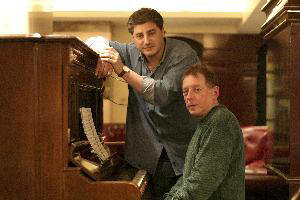 On
this occasion they will present a program that includes the spiritual “Were
You There”, “Cantata” by John Carter, “For a dead infant” as a piano solo,
“Soneto IV” by Carlo Guastavino and the works of Gabriel Fauré “Prison” and
“Chason dámour”. After ‘Balada en sol menor Op. 23” by Maurice Ravel for
solo piano, “Sonetos”, seven musical works composed by José Cura based on
the poems of Pablo Neruda, will be presented. On
this occasion they will present a program that includes the spiritual “Were
You There”, “Cantata” by John Carter, “For a dead infant” as a piano solo,
“Soneto IV” by Carlo Guastavino and the works of Gabriel Fauré “Prison” and
“Chason dámour”. After ‘Balada en sol menor Op. 23” by Maurice Ravel for
solo piano, “Sonetos”, seven musical works composed by José Cura based on
the poems of Pablo Neruda, will be presented.
In the second
part of the concert the artists will perform “Nocturno” by Alberto Muzzio
and “Canción del árbol del olvido” by Alberto Ginastera, with more
selections from the works of Carlos Guastavino including “Se equivocó la
paloma”, “La rosa y el sauce”, “Campanilla”, “Canción de perico”, “El único
camino”, Elegía para un gorrión” and “Canción del carretero”. Finally there
will be the “Canción a la bandera” by Héctor Panizza and, for solo piano,
“Sonatina” by Carlos Guastavino and “Adiós Nonino” by Astor Piazzolla.
During
rehearsal prior to the presentation, the artists talked with La Capital
about their pleasure at the opportunity to celebrate the anniversary of the
Mozarteum Argentino Filial Rosario and at the same time to perform together
in front of their hometown. “This recital is the first time we have worked
together,” declared Delgado. “Before this, we did the CD Anhelo (1999), in
which the guitarist Ernesto Bitetti also participated,” he explained.
Cura performed a series of
“Samsons” in concert version at the Teatro Coliseo in Buenos Aires that
received very good reviews. “There is great payback in the spectacle and
more than anything else the emotions of singing with all my companions from
the Colón after an absence of eight years,” explains the singer, “created an
emotional charge of such great energy that it shocked the audience.”
Delgado is happy to share the celebration: "I feel
very honored to do this with José, because he is an international figure who
performs in all the great theaters in the world and the chosen schedule is
of our music, which is so beautiful,” he said.
The pianist, who has recorded all the work of Alberto
Ginastera and is now preparing for a concert he will give in London next
November, emphasized that next to Cura, the star of the performance will be
"a concert of chamber music, not of song and piano. The piano and the voice
become two instruments in dialogue and with José I have a very special
musical understanding".
Both musicians reveal a state of mind with a degree of
anxiety they do not try to hide. “We artists are like football players
because when we enter the field, it doesn’t matter to the people that we
have played well and scored ten goals before: it is what you do for them
now,” Cura explains.

José Cura
Writes of Love
The tenor premieres his own
songs based on poems of Pablo Neruda
Saturday
July 7, 2007
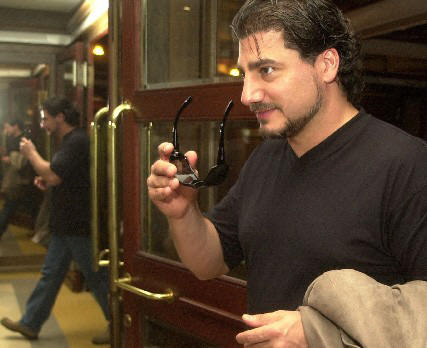 With
his performances in Samson et Dalila presented by the Teatro Colón,
José Cura gave ample evidence to the Argentine public of why his name is
where it is in the world of opera. Nevertheless, and not to lose the habit
of being pleasantly surprised, an important moment still remains on his
agenda before the tenor returns to Europe. It is a question this time of
the world premiere of his Sonnets, based on the poems of Pablo
Neruda, that take place tomorrow in the program for the Mozarteum of
Rosario, which is celebrating its Silver Anniversary with a concert by José
Cura and pianist Eduardo Delgado in the Foundation Astengo. The two,
acquainted through the CD of Argentine music Anhelo, will offer a
chamber recital, including songs from the recording, works for solo piano,
and the pieces composed by Cura. With
his performances in Samson et Dalila presented by the Teatro Colón,
José Cura gave ample evidence to the Argentine public of why his name is
where it is in the world of opera. Nevertheless, and not to lose the habit
of being pleasantly surprised, an important moment still remains on his
agenda before the tenor returns to Europe. It is a question this time of
the world premiere of his Sonnets, based on the poems of Pablo
Neruda, that take place tomorrow in the program for the Mozarteum of
Rosario, which is celebrating its Silver Anniversary with a concert by José
Cura and pianist Eduardo Delgado in the Foundation Astengo. The two,
acquainted through the CD of Argentine music Anhelo, will offer a
chamber recital, including songs from the recording, works for solo piano,
and the pieces composed by Cura.
The history of these Sonnets was born
in 1995, when José sang in Palermo (Sicily) in the Zandonai opera
Francesca di Rimini, based on the legendary lover Romeo and Juliet.
Someone—he never knew who—left a book of Neruda poems in his dressing room
with an anonymous dedication that says, “For you, who sing of love, words of
love.” On opening the book, according to the tenor, the first thing he
read was the last sonnet that says “When I die, I want you hands on my eyes”
and he was so moved by emotion that the music was composed almost at once in
a single moment of inspiration. He continued with “My love, if I should die
and you should not” until the commitments and the dizzying life of the
singer on the rise forced him to put all the beautiful ideas and sensation
in a drawer not to be opened for several years, until, in 2006, the composer
firmly decided to finish the project and to choose the sonnets that, he
felt, still remained to complete the cycle. The author of the dedication,
very romantically, has never been revealed.
In Buenos Aires, La Nacion met with Cura and
Delgado. The pianist referred to the work as personal music whose harmonies
declare a proper and elaborate language. “They do not look like anything
else. They are interesting works and with their polyphonies and
counterpoints, they are also difficult. It gave me pleasure to work with
them because they demanded I study them and because I feel I can relate with
José’s musicality,” Delgado explained.
In turn, Cura added comments that referred
to the composition of the Sonnets.
-Are they composed for your own voice?
They are written for a high baritone because I consider
the voice of a baritone the most beautiful one for chamber music, as in that
of the mezzo for a woman. The middle zone is where the voice flows more
sweet and less forced. This reflects my own vocals: a dark voice with the
ability to sing high notes. It is not possible to sing them like normal
songs. They are intellectual, which means they cannot be learned by hearing
them, it is necessary to be able to read and to understand in depth the
music that, in reality, is a long duet of piano and song.
- How did you transfer the musicality of the
word to that of the singing voice?
-The poetry of Neruda awaken the senses, is
theatrical in an old-fashioned way. Each word is loaded with theater and
drama. The options were to write melody accompany the words or to write
music, but with the sensory wealth that opens us up to Neruda’s fascinating
world. The complexity of the music is related to that of the text, so that
it is not necessary to listen to distill pure melody. One must concentrate
in the poems, leaving the melody to present itself alone.
Song and Piano Combine for an
All-round Tribute
José Cura and Eduardo Delgado
celebrated 25 years of the Mozarteum Rosario.
Marcelo Menichetti
The Rosario affiliate of the
Argentinean Mozarteum celebrated 25 years of operation in the city with an
outstanding concert starring tenor José Cura and pianist Eduardo Delgado.
The Rosarino artists, who now live abroad, returned to their hometown to
offer a repertoire of songs which reached absolute high points in the world
premiere of the “Sonetos”, poems by Pablo Neruda set to music by José Cura,
in the instrumental versions by Delgado of Astor Piazzolla’s “Adiós Nonino”
and Carlos Gustavino’s “Bailecito”, and in the brilliant closure with the
“Cancion a la bandera” from Hector Panizza’s opera “Aurora”.
The Fundación Astengo Auditorium was
filled to capacity on the cold night that was last Sunday. The
not-be-postponed, not-to-be-missed event brought the highly acclaimed
singer, who provided the city and his pianist with major international
exposure, back on stage. The reason for the convocation was no less
important: the 25th anniversary of an institution that made
possible the performance in Rosario of a large segment of the top exponents
of the classical genre in recent years, including musicians, conductors,
soloists, chamber ensembles and large orchestras as well as dancers and
singers.
With the check mark of audience
accord, the concert was characterized by a certain informality given it by
the two protagonists. Both artists, unquestionably affected by a cold,
paused to sip tea on stage. That gesture lent the necessary warmth to an
evening spent in a true atmosphere of celebration saluting years of labor
and fittingly capped by the presence of two sons of the city, who today are
winning applause around the world, and who returned to celebrate with music
an anniversary that even found a happy birthday (salute) offered from the
stage.
Translation:
Monica B.

Listen:
Chanson d'amour
La rosa y el sauce


Rosarino
Tenor José Cura
Rosario, 9 July 2007 (DYN) – The Rosarino tenor José
Cura performed in this city after an absence of eight years, accompanied on
piano by another internationally recognized son of Rosario, Eduardo Delgado,
in a celebratory recital in the Teatro Fundación Astengo.
The recital was carried out last night within the
framework of the 25th anniversary of the Mozarteum Argentino
Filial Rosario and before an enthusiastic and effusive audience that filled
the auditorium to capacity.
The audience was attentive to the singer in the
interpretation of works by John Carter, Carlos Guastavino, Alberto
Ginastera, Héctor Panizza, Leonard Bernstein, Gabriel Fauré and of Cura’s
own works, “Sonetos,” a series of songs inspired by the poetry of Chilean
Pablo Neruda.
Cura recalled that in 1999, while he was participating
in a production of Francesca di Rimini in Palermo, Italy, he returned
to his dressing room to find a book of poems by Neruda that had a totally
anonymous dedication: “For you, who sing of love, words of love.”
The tenor said that the emotions that filled him on
reading the verses immediately awoke the desire to compose songs for the
text, but he had to delay [completing the cycle] for some years until he
could finally finish in 2006.
Cura returned to his home town after a series of
concerts performances of Camille Saint-Saëns’ opera “Samson et Dalila” at
the Teatro Coliseo in Buenos Aires. The tenor was accompanied on this
occasion by Delgado, an outstanding pianist who has lived for three decades
in Los Angeles, in the United States, and who returns at least twice a year
to Rosario to visit his mother.
Delgado, who performs as well as teaches at important
educational institutions in the US, served last night as a first rate
accompanist and offered works by Maurice Ravel, Maurice Ravel, Carlos
Guastavino and Ástor Piazzola during the concert.
Cura emphasized that the poems of Neruda “Awaken the
senses, is theatrical in an old-fashioned way. Each word is loaded with
theater and drama.”
“They are written for a high baritone because I
consider the voice of a baritone the most beautiful for chamber music, just
as that of the mezzo is for a woman,” he said.
The tenor last performed in his hometown on Sunday, 11
April 1999, after an absence of twelve years, before an audience of some 40
thousand at the National Monument to the Flag in a concert that included
songs from the Beatles.

July 10, 2007
One of life’s mysterious gifts
José Cura studied composition at the
National University of Rosario’s School of Music, but his career channelled
him into song. “My composing goes back to that period in time; later on I
got totally wrapped up in singing, and today is today, “ recalled the artist
who today will premiere his musical adaptations of seven sonnets based on
the poetry of the Chilean Pablo Neruda. Pleased with (the fruits of) his
labor, he recalled the origin of the songs: “The beginning of this is very
strange and very sweet.” he says, folding his hands on the table before
continuing, “In 1995 I was singing in Palermo, Sicily, and at the end of one
of the performances, when I returned to my dressing room, I found a book of
poems by Neruda. I opened it, and inside was a dedication signed
“Anonymous”. I never knew who sent it to me: neither age, nor color, nor
gender. Nothing. What happened next was that I opened the book, stumbling
upon a poem that I really liked, and automatically set it to music the
following day.”
|
 Almost exactly twelve years ago,
a young and largely unknown Argentinean tenor opened the Royal
Opera's Verdi Festival playing the title role in Stiffelio,
Verdi's long-neglected masterpiece of 1850. But in the interim,
José Cura has risen to become one of the most highly-acclaimed
and beloved singers of his generation; at Covent Garden, he has
performed leading roles in operas such as Samson et Dalila, Il
trovatore, Andrea Chénier and most recently La fanciulla del
West.
Almost exactly twelve years ago,
a young and largely unknown Argentinean tenor opened the Royal
Opera's Verdi Festival playing the title role in Stiffelio,
Verdi's long-neglected masterpiece of 1850. But in the interim,
José Cura has risen to become one of the most highly-acclaimed
and beloved singers of his generation; at Covent Garden, he has
performed leading roles in operas such as Samson et Dalila, Il
trovatore, Andrea Chénier and most recently La fanciulla del
West. 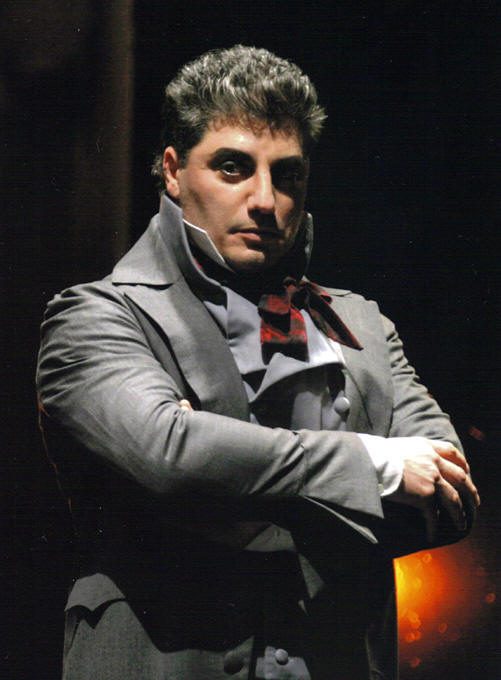





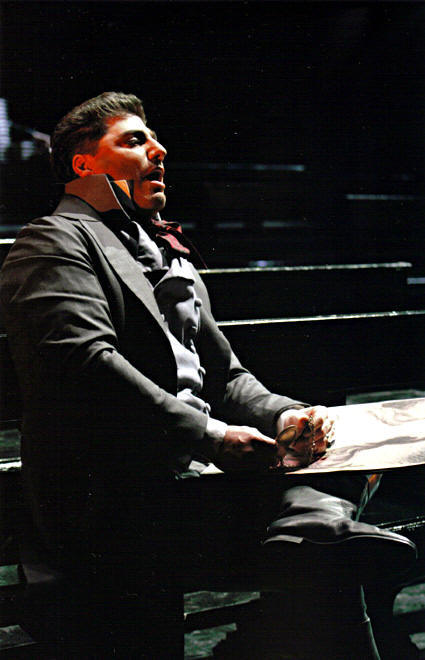




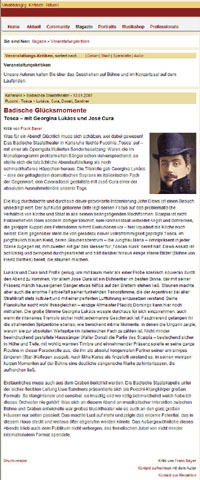






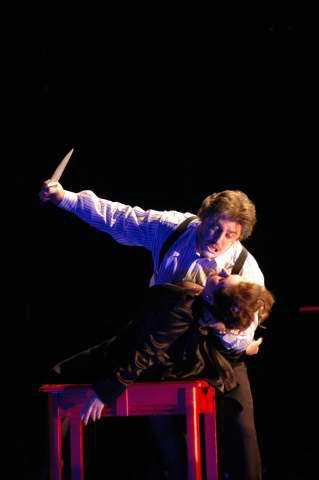







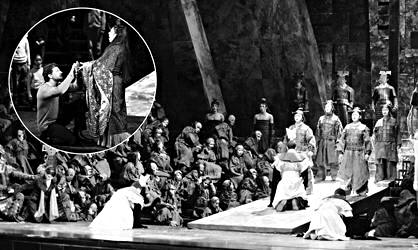






.jpg)
.jpg)


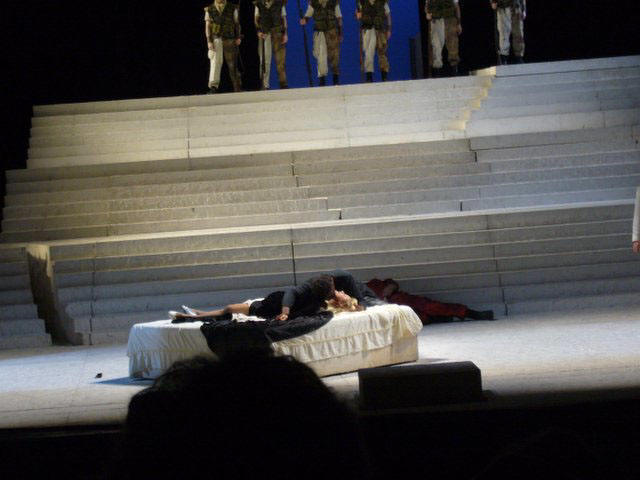

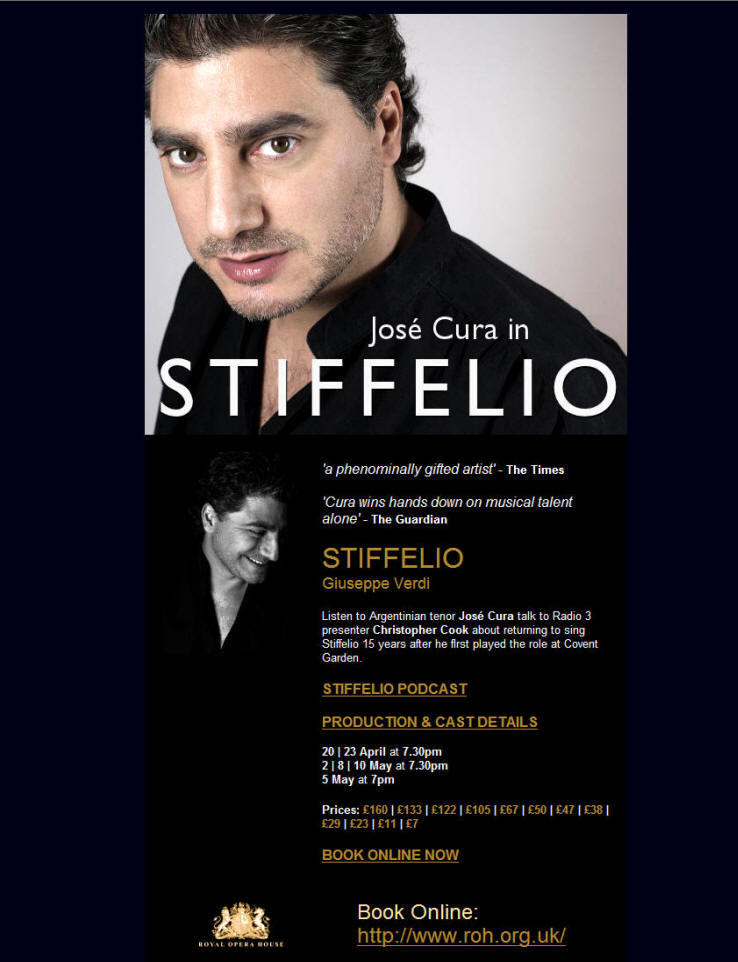

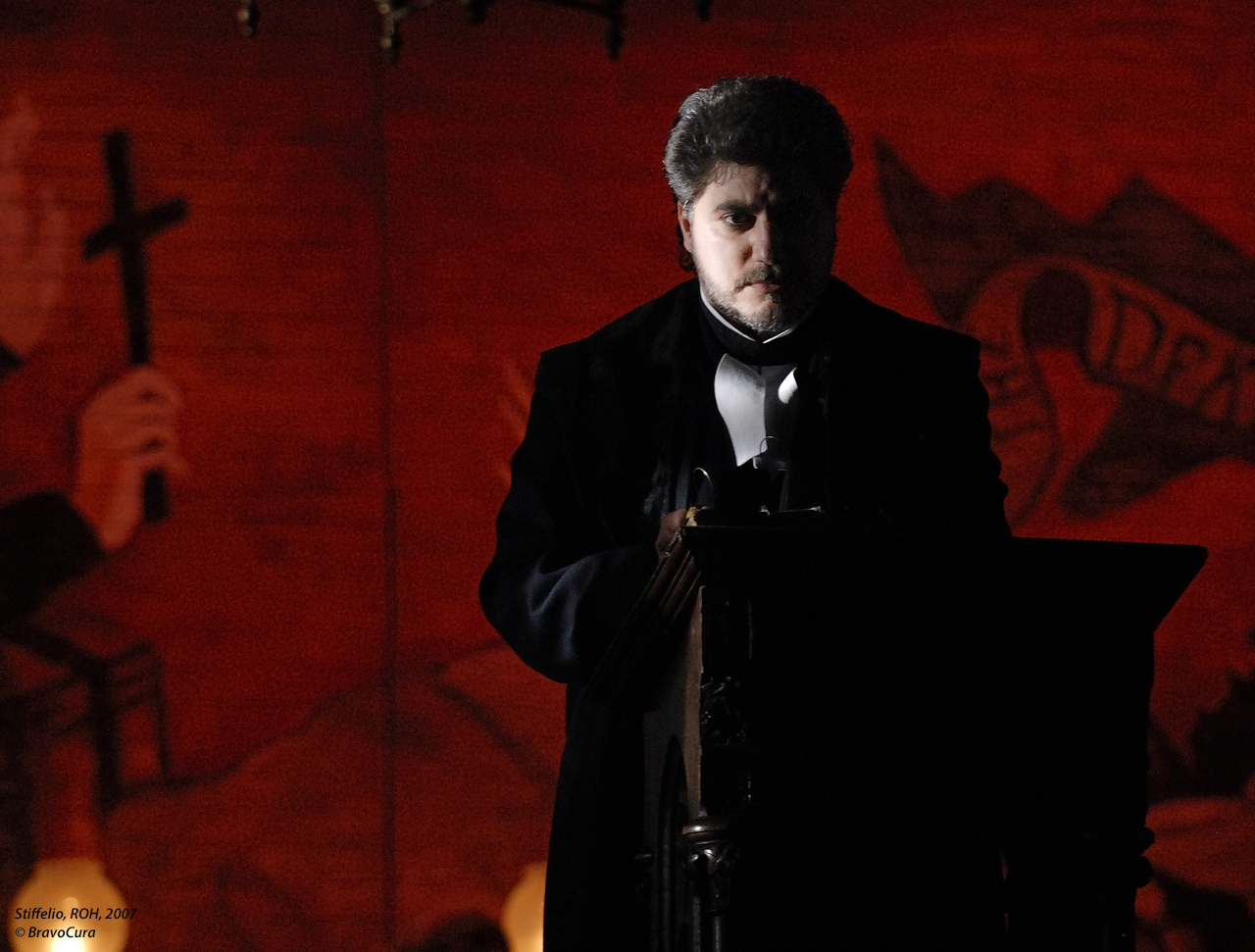
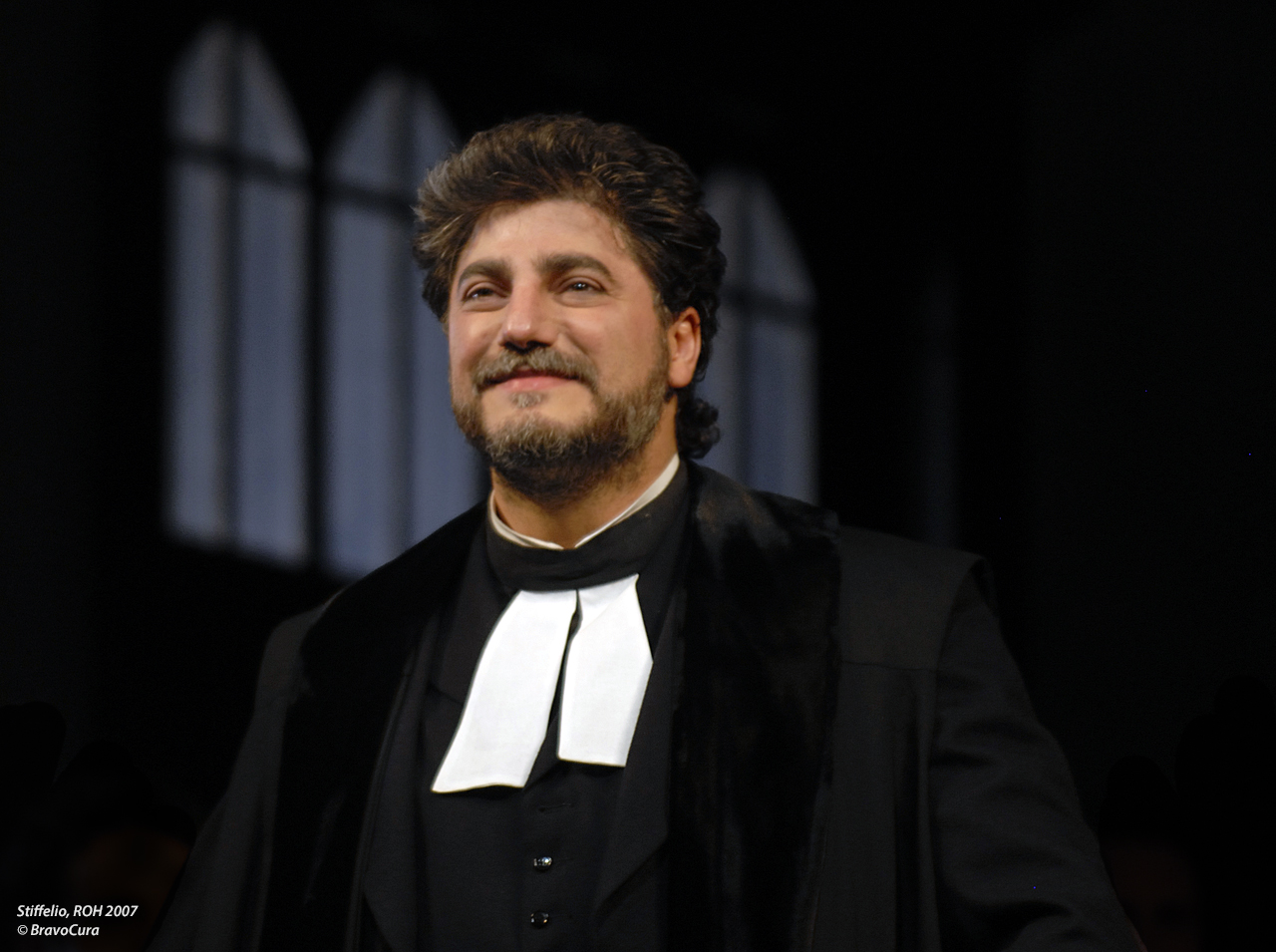
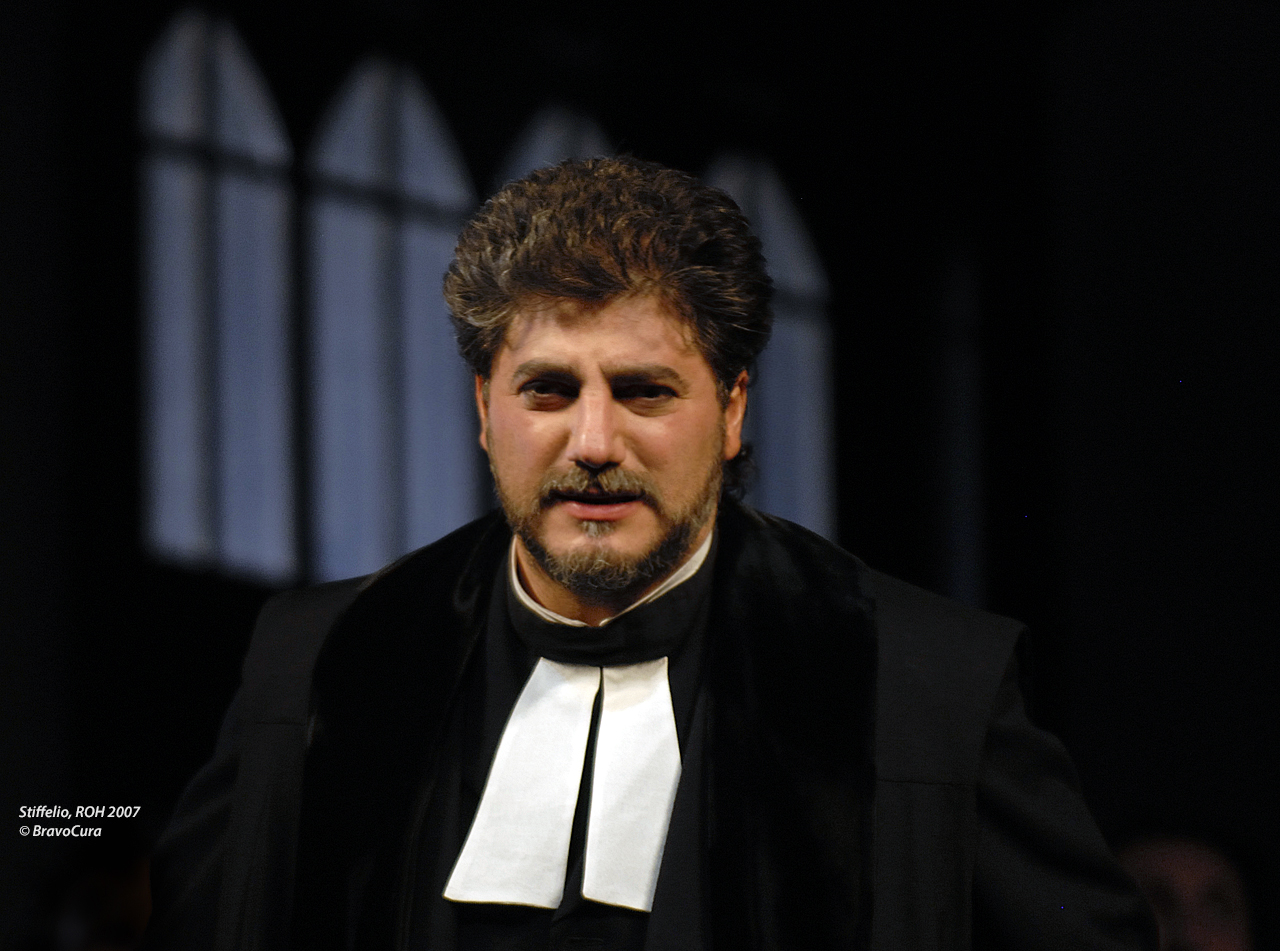



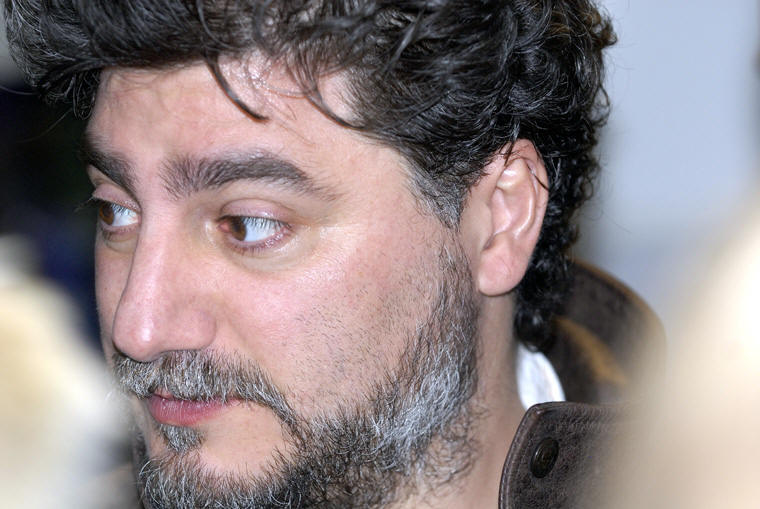
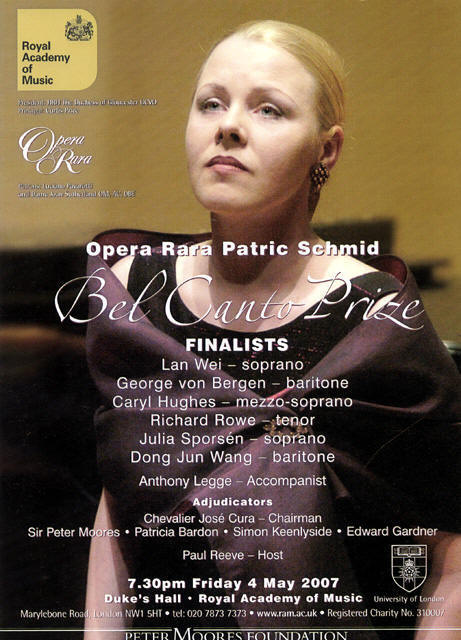

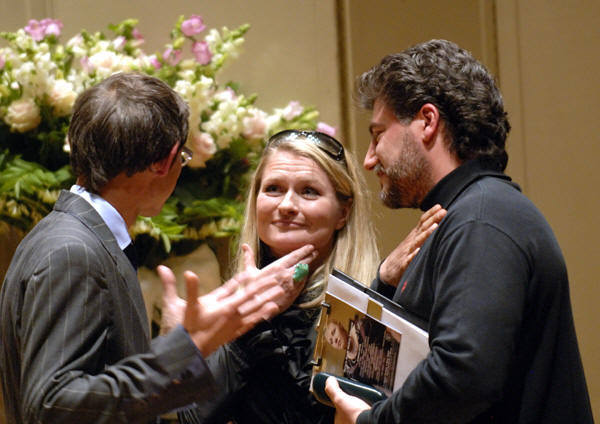




 Regarding
the opera that he has come here to sing, “Stiffelio”—the same one in which
he made his London debut in 1995—Cura feels obliged to defend himself
against some of the reviews of the production that have recently been
published. The critics have made note of the extraordinary vocal power of
the principal singers, Cura (the Protestant pastor Stiffelio), the North
American soprano Sondra Radvanovsky (Lina, his adulterous wife) and the
Italian baritone Roberto Frontali (her father).
Regarding
the opera that he has come here to sing, “Stiffelio”—the same one in which
he made his London debut in 1995—Cura feels obliged to defend himself
against some of the reviews of the production that have recently been
published. The critics have made note of the extraordinary vocal power of
the principal singers, Cura (the Protestant pastor Stiffelio), the North
American soprano Sondra Radvanovsky (Lina, his adulterous wife) and the
Italian baritone Roberto Frontali (her father).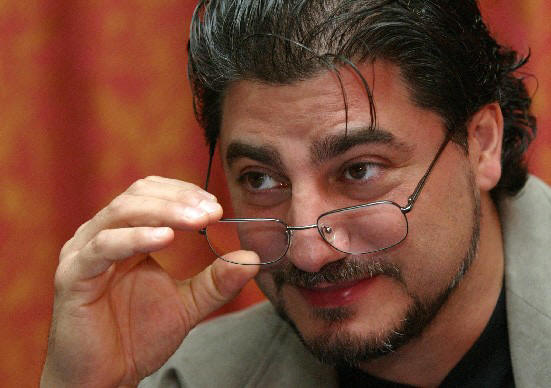
%20a.jpg)

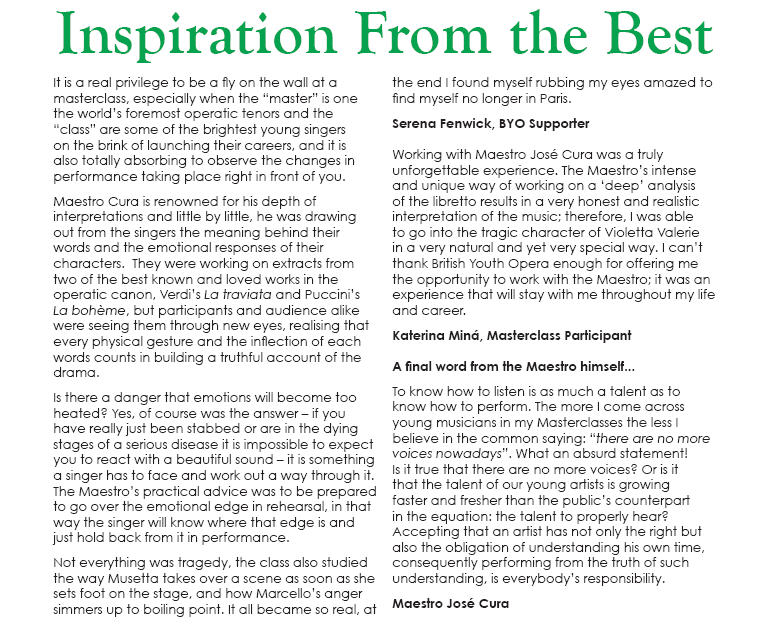
%20a.jpg)
%20a.jpg)
%20a.jpg)
%20a.jpg)
%20a.jpg)
%20a.jpg)
.jpg)
%20a.jpg)
%20a.jpg)
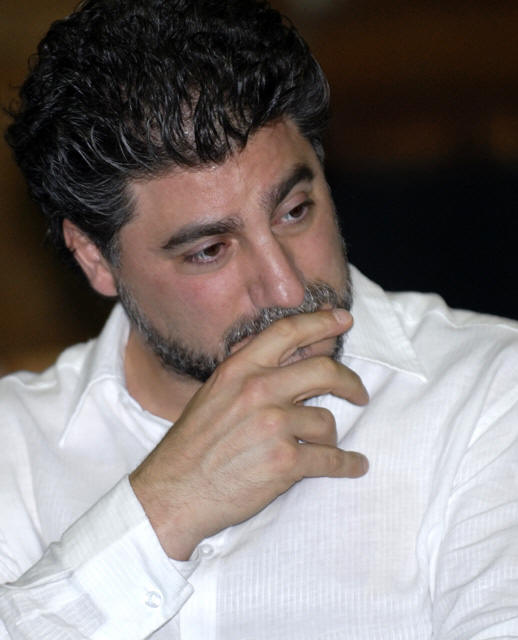 World famous tenor José Cura has been in
Devon for a masterclass with 12 lucky opera singers culminating
in a gala concert at Stover School.
World famous tenor José Cura has been in
Devon for a masterclass with 12 lucky opera singers culminating
in a gala concert at Stover School.



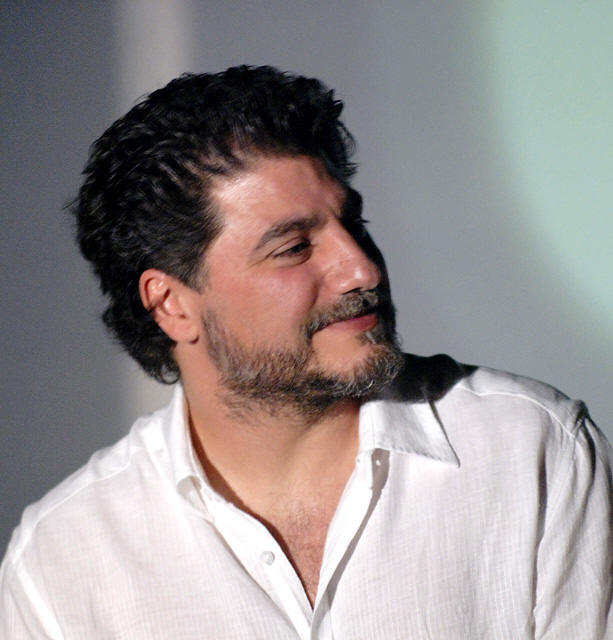
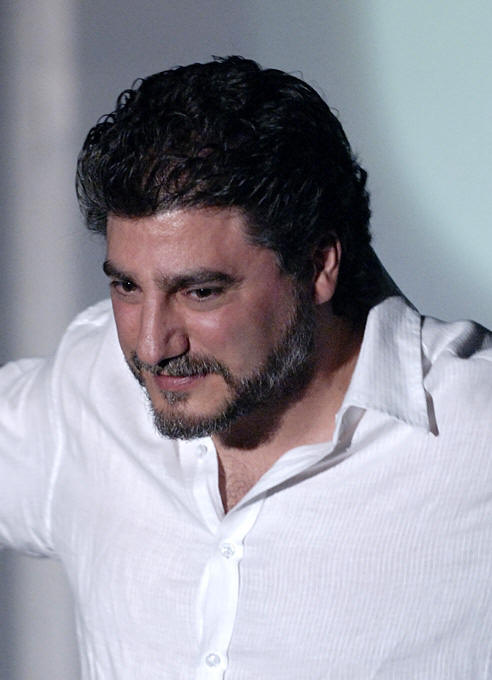
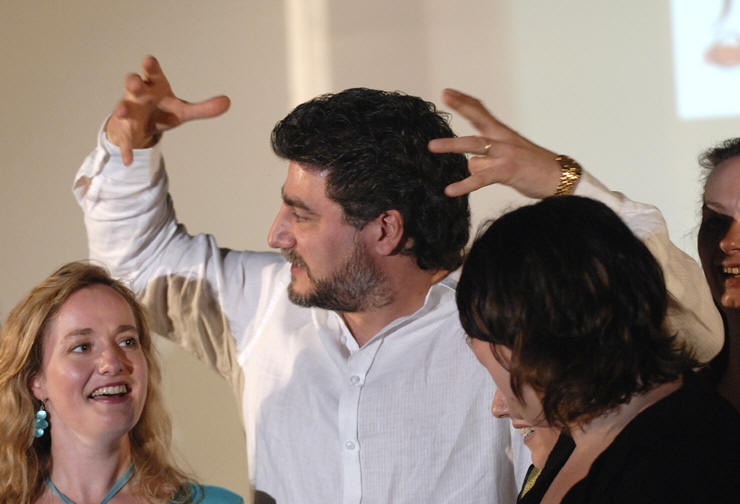



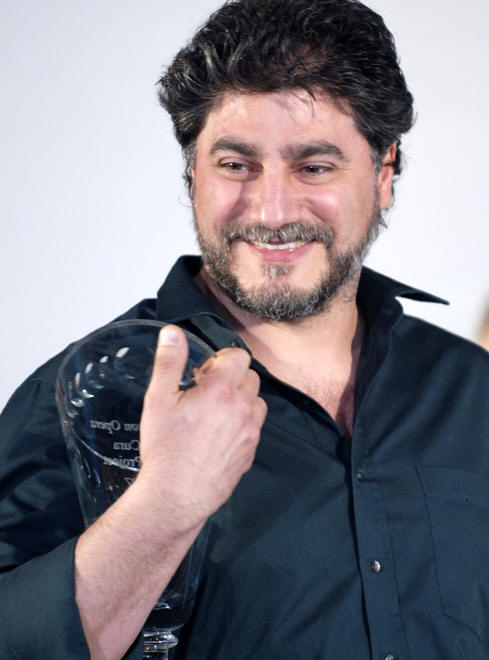




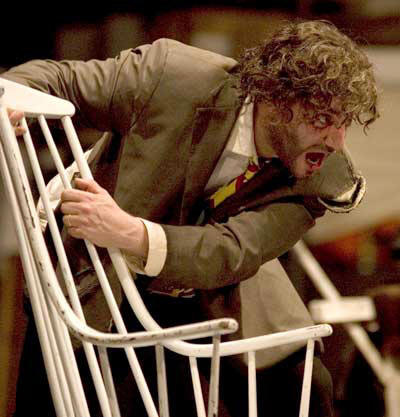



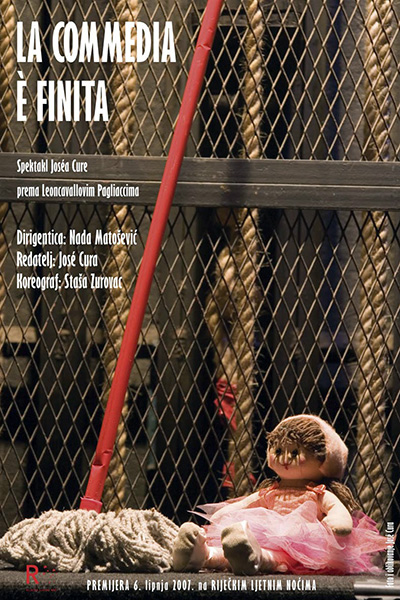

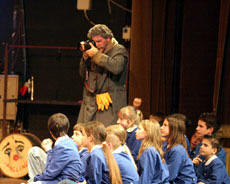
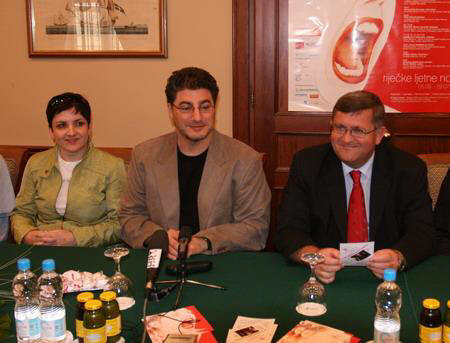

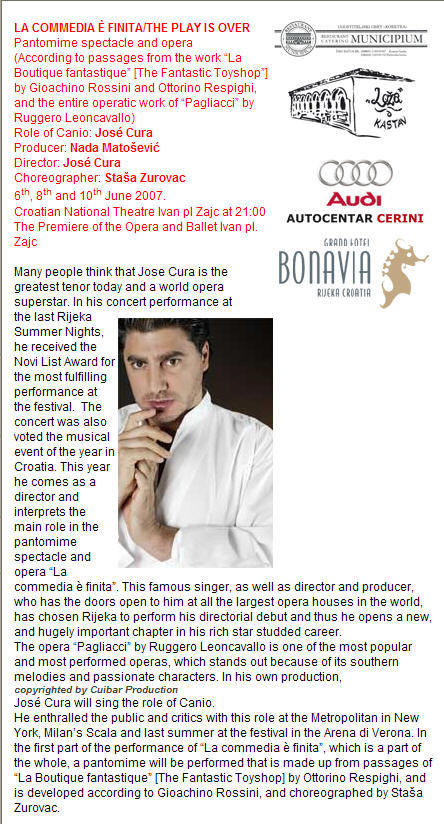
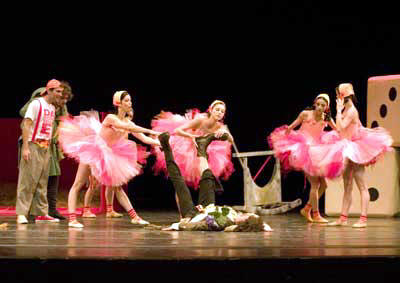
.jpg)
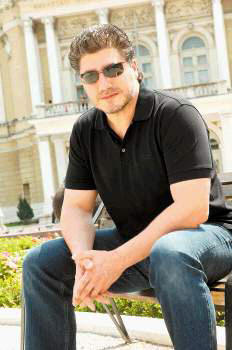

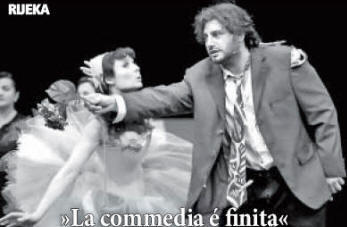
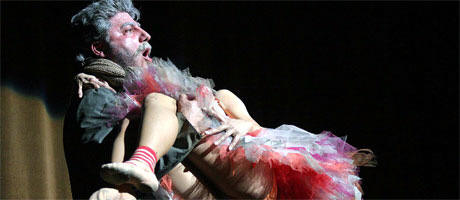



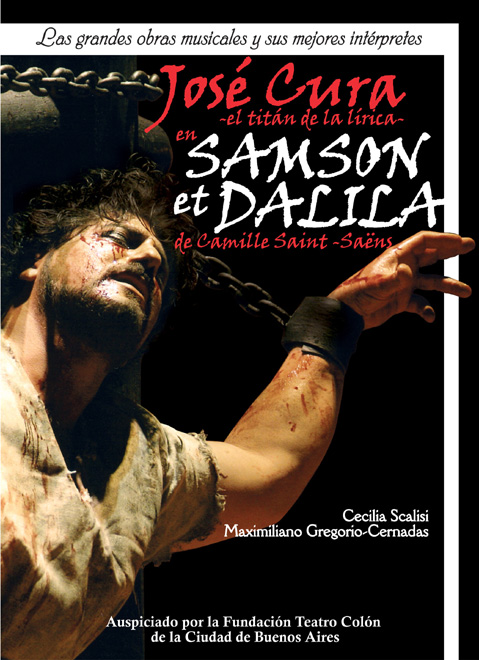

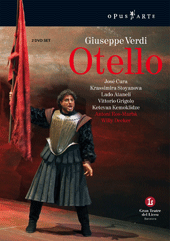



 Opera News, June 2007
//
R. Baxter
Opera News, June 2007
//
R. Baxter
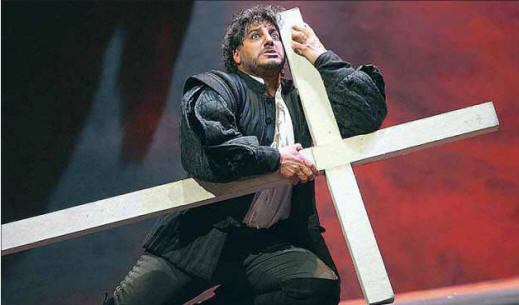


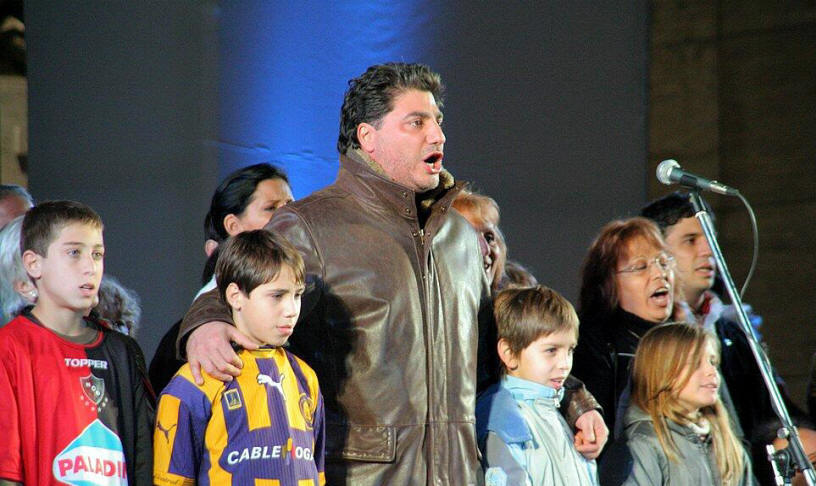
 Applauded
by the critics for his interpretations of Giuseppe Verdi’s
“Otello” and Saint-Saens’ “Samson”, Cura is also recognized for
being the first artist to have sung and conducted the same work
simultaneously as well as being the first to combine vocal with
symphonic performances in the same concert.
Applauded
by the critics for his interpretations of Giuseppe Verdi’s
“Otello” and Saint-Saens’ “Samson”, Cura is also recognized for
being the first artist to have sung and conducted the same work
simultaneously as well as being the first to combine vocal with
symphonic performances in the same concert.
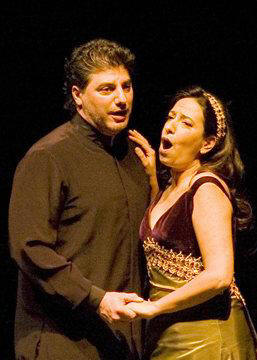


.jpg)



 After
an eight year absence, the Rosarino tenor José Cura returns to
Buenos Aires in a concert version of Camille Saint-Saens’ opera
Samson and Dalila, which will be presented tomorrow at the
Coliseo as part of the Colón’s season. Recognized as one of the
great voices of today on the international scene, José Cura is a
very unusual artist who, besides singing, conducts orchestras,
composes, and also has recently started to make incursions into
stage management/directing.
After
an eight year absence, the Rosarino tenor José Cura returns to
Buenos Aires in a concert version of Camille Saint-Saens’ opera
Samson and Dalila, which will be presented tomorrow at the
Coliseo as part of the Colón’s season. Recognized as one of the
great voices of today on the international scene, José Cura is a
very unusual artist who, besides singing, conducts orchestras,
composes, and also has recently started to make incursions into
stage management/directing.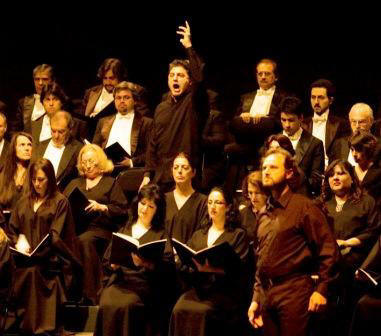
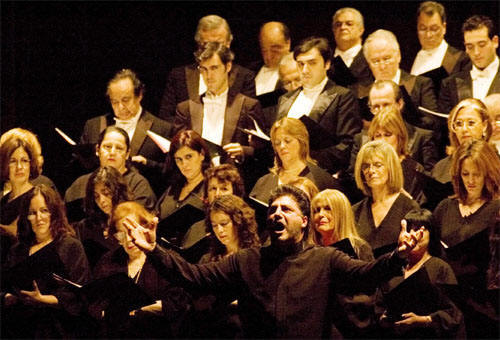



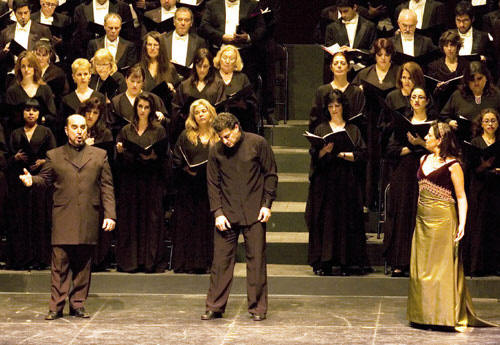



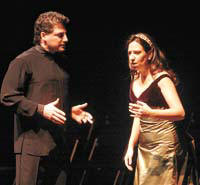
 In
the fifteen years of his successful international career, José Cura has
frequented not only the most prestigious halls and theaters in the
classical music world (Met, Covent Garden, LaScala, Opera National in
Paris, Staatsoper in Vienna, Hamburg and Zurich, and the Deutsche Oper
in Berlin among others) but has also been present on remote stages, has
visited countries far removed from the traditional circuit, has
conquered exotic audiences as to opera and untiringly carried the art of
music and theater to inconceivable corners of the world. At his side
sing the most glamorous divas and direct the most celebrated conductors.
Parallel to his intense activity in the theater (as conductor, singer
and régisseur), he exploits his ample qualities as communicator and
showman with surprising ease, offering recitals and shows—some of them
on outdoor stages in front of thousands of people—in which he combines
singing with orchestral conducting (in an original format he himself
calls ‘half and half’), something that has earned him both the criticism
from the most conservative sectors of the music media and the admiration
of his fans, as well as an unusual popularity for an artist in the
classical genre.
In
the fifteen years of his successful international career, José Cura has
frequented not only the most prestigious halls and theaters in the
classical music world (Met, Covent Garden, LaScala, Opera National in
Paris, Staatsoper in Vienna, Hamburg and Zurich, and the Deutsche Oper
in Berlin among others) but has also been present on remote stages, has
visited countries far removed from the traditional circuit, has
conquered exotic audiences as to opera and untiringly carried the art of
music and theater to inconceivable corners of the world. At his side
sing the most glamorous divas and direct the most celebrated conductors.
Parallel to his intense activity in the theater (as conductor, singer
and régisseur), he exploits his ample qualities as communicator and
showman with surprising ease, offering recitals and shows—some of them
on outdoor stages in front of thousands of people—in which he combines
singing with orchestral conducting (in an original format he himself
calls ‘half and half’), something that has earned him both the criticism
from the most conservative sectors of the music media and the admiration
of his fans, as well as an unusual popularity for an artist in the
classical genre.
 When
José Cura came down punctually to the lobby to give us his final interview
before returning to Europe, I thought it was gracious of him not to have
canceled after the effort of the previous night’s concert when he sang while
suffering from an untimely cold (for a singer, a cold is always untimely).
Besides, it was a very cold 9 July (Rosarinos hardly remember when it was
really cold) and many expected snow. I will never forget when it snowed
in Rosario a few days before my entire family was involved in a car accident
and we saw the snow on the windows of the hospital, recalled the
Rosarino musician (singer, director, composer) who now lives in Madrid but
works in capital cities around the world.
When
José Cura came down punctually to the lobby to give us his final interview
before returning to Europe, I thought it was gracious of him not to have
canceled after the effort of the previous night’s concert when he sang while
suffering from an untimely cold (for a singer, a cold is always untimely).
Besides, it was a very cold 9 July (Rosarinos hardly remember when it was
really cold) and many expected snow. I will never forget when it snowed
in Rosario a few days before my entire family was involved in a car accident
and we saw the snow on the windows of the hospital, recalled the
Rosarino musician (singer, director, composer) who now lives in Madrid but
works in capital cities around the world. 

.jpg) José
Cura (44) traveled to Argentina to attend the golden anniversary of his
parents (the celebration is on Saturday 7 July in Rosario, his hometown).
He is accompanied by his wife, Silvia, and their three children: José (19),
Yazmín (14) and Nicolás (11). The visit, at first a secret, was quickly
divulged and the family plan was subsequently interrupted by five
performances of Samson et Dalila (by Camille Saint-Saëns) in the Teatro
Coliseo, with the artistic support of the Teatro Colón, and in Rosario with
the festival of the 50 years of the Monument to the Flag and a chamber
concert in commemoration of the 25th anniversary of Mozarteum,
(8 July) where he will present the world premier of the
José
Cura (44) traveled to Argentina to attend the golden anniversary of his
parents (the celebration is on Saturday 7 July in Rosario, his hometown).
He is accompanied by his wife, Silvia, and their three children: José (19),
Yazmín (14) and Nicolás (11). The visit, at first a secret, was quickly
divulged and the family plan was subsequently interrupted by five
performances of Samson et Dalila (by Camille Saint-Saëns) in the Teatro
Coliseo, with the artistic support of the Teatro Colón, and in Rosario with
the festival of the 50 years of the Monument to the Flag and a chamber
concert in commemoration of the 25th anniversary of Mozarteum,
(8 July) where he will present the world premier of the
.jpg) -
I was always very stubborn. Like young children, each time they get up in
the morning it is not important to them what happened the previous day, just
that they are going to play again. I believe I am like that. I was always
convinced I had something to say, I was prepared to say it, and was going to
keep on saying it until I finally found someone who would listen to what I
had to say and then this person would pass it on to others. It is being
eternally young beyond all mistakes and objections. It causes one to want
to continue forward with the same thing.
-
I was always very stubborn. Like young children, each time they get up in
the morning it is not important to them what happened the previous day, just
that they are going to play again. I believe I am like that. I was always
convinced I had something to say, I was prepared to say it, and was going to
keep on saying it until I finally found someone who would listen to what I
had to say and then this person would pass it on to others. It is being
eternally young beyond all mistakes and objections. It causes one to want
to continue forward with the same thing.

 “The
oldest images I retain of Rosario,” he recalls, “are the first two or three
days of primary school. I do not know if that was in the LaSalle or San
José School, because after three days my parents withdrew me to enroll me
into a new school, one that had just opened by the brothers of Saint Patrick
of Ireland. We were the first class. There were barely two rooms and a
patio. My class was also the first class to graduate. Today it is a great
school, one of the biggest in Rosario. The last time I was in Argentina, in
1999, I visited the school, I met with the students and I encountered a
couple of my former companions. So there is where I begin my memories of
Rosario, in the little school of St Patrick. In reality so many years have
passed…and it is only now when I return that I perceive this passing of
time.” The imaginary route soon pass by his old house near the river and
the second one in the first residential district of Rosario. Almost
immediately, and understanding the strong connection that joins them, music
arrived and, of course, with it the beginning of the history whose future
chapters would cause him to do nothing less than conquer the world. “Music
always formed part of my family. My father played piano well enough. I
have a very clear image of when, as a boy, I watched him, seated at the
piano, playing Chopin and Liszt. Then he tried to imprint on me his own
story as a boy, sending me to study piano with a teacher in the
neighborhood. But the initiative did not work.” After a few months, the
teacher dismissed his young student with a brief note sent to his parents,
in which he explained, sadly, that it would be best to wait for a time when
an interest [in music] developed in José that had, to that moment, not been
demonstrated, and at the same time he recommended looking for a hobby that
appealed to the young man, because musical sensitivity did not seem strong
in him. “It was probably true at that time, and the best example was that,
from that moment, I began to devote myself to rugby.”
“The
oldest images I retain of Rosario,” he recalls, “are the first two or three
days of primary school. I do not know if that was in the LaSalle or San
José School, because after three days my parents withdrew me to enroll me
into a new school, one that had just opened by the brothers of Saint Patrick
of Ireland. We were the first class. There were barely two rooms and a
patio. My class was also the first class to graduate. Today it is a great
school, one of the biggest in Rosario. The last time I was in Argentina, in
1999, I visited the school, I met with the students and I encountered a
couple of my former companions. So there is where I begin my memories of
Rosario, in the little school of St Patrick. In reality so many years have
passed…and it is only now when I return that I perceive this passing of
time.” The imaginary route soon pass by his old house near the river and
the second one in the first residential district of Rosario. Almost
immediately, and understanding the strong connection that joins them, music
arrived and, of course, with it the beginning of the history whose future
chapters would cause him to do nothing less than conquer the world. “Music
always formed part of my family. My father played piano well enough. I
have a very clear image of when, as a boy, I watched him, seated at the
piano, playing Chopin and Liszt. Then he tried to imprint on me his own
story as a boy, sending me to study piano with a teacher in the
neighborhood. But the initiative did not work.” After a few months, the
teacher dismissed his young student with a brief note sent to his parents,
in which he explained, sadly, that it would be best to wait for a time when
an interest [in music] developed in José that had, to that moment, not been
demonstrated, and at the same time he recommended looking for a hobby that
appealed to the young man, because musical sensitivity did not seem strong
in him. “It was probably true at that time, and the best example was that,
from that moment, I began to devote myself to rugby.”  But
when did he discover his extraordinary vocation in music and what was that
cause that permanently awoke his sensibilities? Oddly and without warning,
that event was the result of an examination to enter secondary school. “I
was there with one of my best friends. He played his guitar, the Beatles
were fashionable, and he created a lot of interest. I learned to play
immediately and the experience awoke the calling that had been sleeping
within me.” This was the friend who gave him his first set of tools. Soon,
his father contacted Ernesto Bitteti (an old family friend), and Bitteti
recommended a professor with whom to study seriously. That began the
history with the guitar. “With my exuberant and extroverted personality, I
was like a time bomb. I learned to play well enough, although always
somewhat hampered by my very large hands…the things were causing me quite a
lot of work but I managed to have good results. The guitar, though, very
quickly made me feel small, not in a technical sense but in the fact of it
being a very introverted instrument. For that reason, I entered the
Conservatory in Rosario to study conducting and composition.”
But
when did he discover his extraordinary vocation in music and what was that
cause that permanently awoke his sensibilities? Oddly and without warning,
that event was the result of an examination to enter secondary school. “I
was there with one of my best friends. He played his guitar, the Beatles
were fashionable, and he created a lot of interest. I learned to play
immediately and the experience awoke the calling that had been sleeping
within me.” This was the friend who gave him his first set of tools. Soon,
his father contacted Ernesto Bitteti (an old family friend), and Bitteti
recommended a professor with whom to study seriously. That began the
history with the guitar. “With my exuberant and extroverted personality, I
was like a time bomb. I learned to play well enough, although always
somewhat hampered by my very large hands…the things were causing me quite a
lot of work but I managed to have good results. The guitar, though, very
quickly made me feel small, not in a technical sense but in the fact of it
being a very introverted instrument. For that reason, I entered the
Conservatory in Rosario to study conducting and composition.”  “One
of the characteristics of classical music is that it is one of the few forms
of art that remains, between one person and another, a single thing: to the
work of art itself. We interpret that work live, without networks and
without lies. That artisan concept is probably the most important aspect of
music and, in my opinion, why it continues to work, although as a spectacle
it may be a little anachronistic. It is an art of skin and bone, fact with
flood, sweat and tears, and for that reason it is an expression that stays
alive. It is my hope that all people, at least once in their lives, are
touched by this sensation, so powerful and so extraordinary.”
“One
of the characteristics of classical music is that it is one of the few forms
of art that remains, between one person and another, a single thing: to the
work of art itself. We interpret that work live, without networks and
without lies. That artisan concept is probably the most important aspect of
music and, in my opinion, why it continues to work, although as a spectacle
it may be a little anachronistic. It is an art of skin and bone, fact with
flood, sweat and tears, and for that reason it is an expression that stays
alive. It is my hope that all people, at least once in their lives, are
touched by this sensation, so powerful and so extraordinary.”

 On
this occasion they will present a program that includes the spiritual “Were
You There”, “Cantata” by John Carter, “For a dead infant” as a piano solo,
“Soneto IV” by Carlo Guastavino and the works of Gabriel Fauré “Prison” and
“Chason dámour”. After ‘Balada en sol menor Op. 23” by Maurice Ravel for
solo piano, “Sonetos”, seven musical works composed by José Cura based on
the poems of Pablo Neruda, will be presented.
On
this occasion they will present a program that includes the spiritual “Were
You There”, “Cantata” by John Carter, “For a dead infant” as a piano solo,
“Soneto IV” by Carlo Guastavino and the works of Gabriel Fauré “Prison” and
“Chason dámour”. After ‘Balada en sol menor Op. 23” by Maurice Ravel for
solo piano, “Sonetos”, seven musical works composed by José Cura based on
the poems of Pablo Neruda, will be presented. With
his performances in Samson et Dalila presented by the Teatro Colón,
José Cura gave ample evidence to the Argentine public of why his name is
where it is in the world of opera. Nevertheless, and not to lose the habit
of being pleasantly surprised, an important moment still remains on his
agenda before the tenor returns to Europe. It is a question this time of
the world premiere of his Sonnets, based on the poems of Pablo
Neruda, that take place tomorrow in the program for the Mozarteum of
Rosario, which is celebrating its Silver Anniversary with a concert by José
Cura and pianist Eduardo Delgado in the Foundation Astengo. The two,
acquainted through the CD of Argentine music Anhelo, will offer a
chamber recital, including songs from the recording, works for solo piano,
and the pieces composed by Cura.
With
his performances in Samson et Dalila presented by the Teatro Colón,
José Cura gave ample evidence to the Argentine public of why his name is
where it is in the world of opera. Nevertheless, and not to lose the habit
of being pleasantly surprised, an important moment still remains on his
agenda before the tenor returns to Europe. It is a question this time of
the world premiere of his Sonnets, based on the poems of Pablo
Neruda, that take place tomorrow in the program for the Mozarteum of
Rosario, which is celebrating its Silver Anniversary with a concert by José
Cura and pianist Eduardo Delgado in the Foundation Astengo. The two,
acquainted through the CD of Argentine music Anhelo, will offer a
chamber recital, including songs from the recording, works for solo piano,
and the pieces composed by Cura.




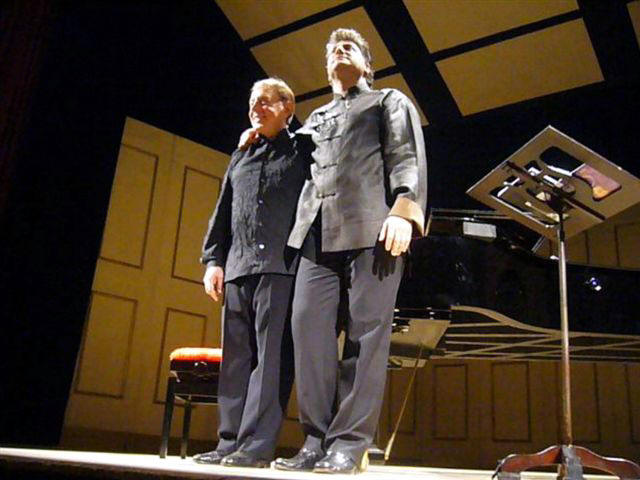

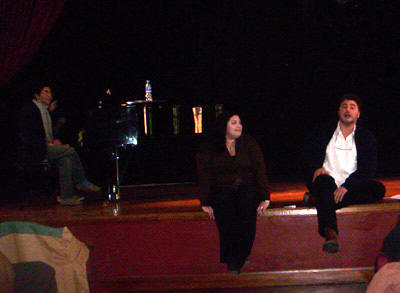

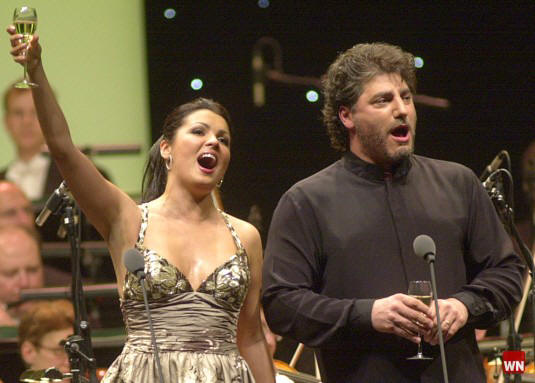
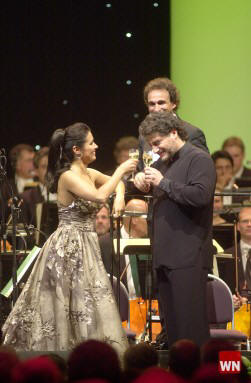
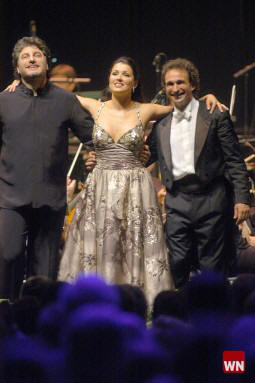


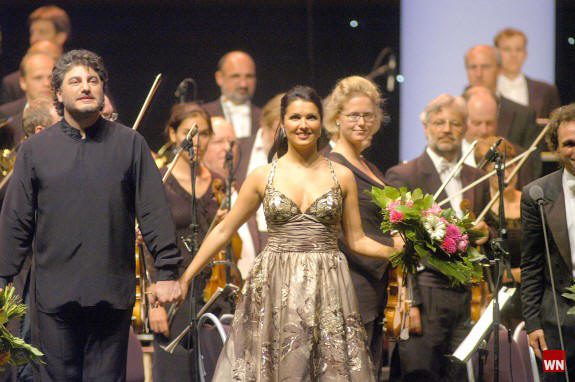


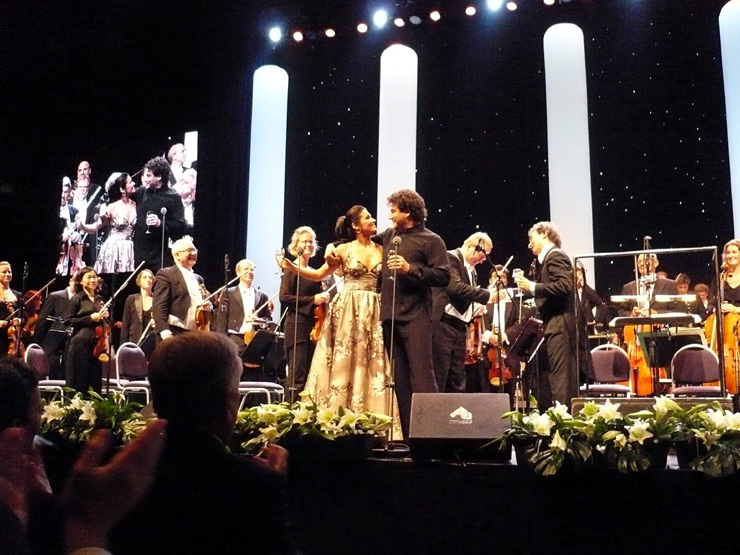


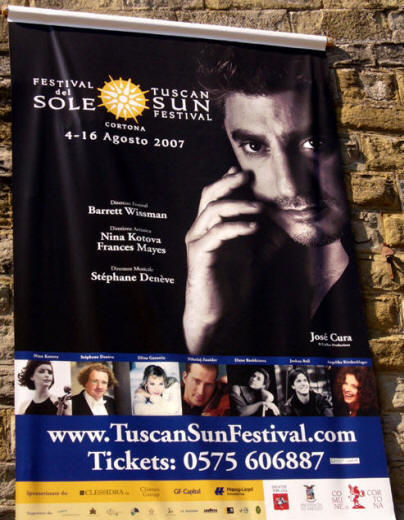
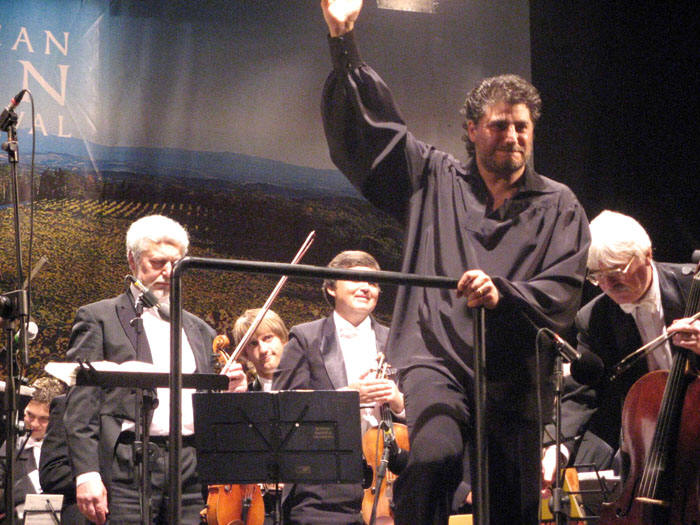


.jpg)

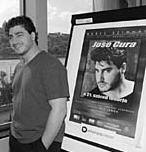 Although
he has not sung in France for over six years—for reasons he can’t explain—he
is driven to share his knowledge with the next generation.
Although
he has not sung in France for over six years—for reasons he can’t explain—he
is driven to share his knowledge with the next generation.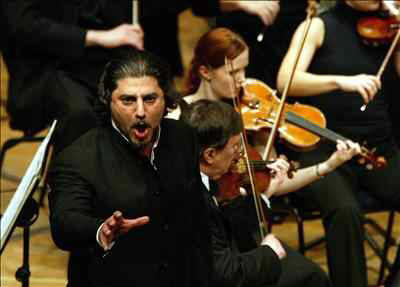 “I
am not the Pope, I do not teach dogma, I merely transmit my experiences.
The beauty and the success of a voice is somewhat subjective but there is
nothing subjective about a human’s commitment, both artistically and
professionally. It is something I take very seriously and it has become my
cause," he commented.
“I
am not the Pope, I do not teach dogma, I merely transmit my experiences.
The beauty and the success of a voice is somewhat subjective but there is
nothing subjective about a human’s commitment, both artistically and
professionally. It is something I take very seriously and it has become my
cause," he commented.


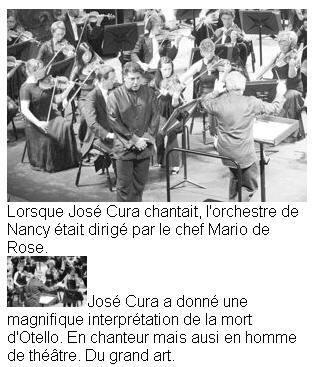




 The operatic tradition of the City of Dukes de
Lorraine has been well established for years and many natives of Nancy
remember - and have carefully preserve the programs - the fabulous lyric
seasons of the [19]50s, when a new spectacle would be presented every
week! It was not rare to attend, to list only two titles, Postillon
de Longjumeau by Adolphe Adams or La Poupée by Edmond
Audran. Over the years the city has not been able to preserve such
recurrences of opera magic but has continued to treat the public with
high quality entertainment presented by artists of national and
international fame.
The operatic tradition of the City of Dukes de
Lorraine has been well established for years and many natives of Nancy
remember - and have carefully preserve the programs - the fabulous lyric
seasons of the [19]50s, when a new spectacle would be presented every
week! It was not rare to attend, to list only two titles, Postillon
de Longjumeau by Adolphe Adams or La Poupée by Edmond
Audran. Over the years the city has not been able to preserve such
recurrences of opera magic but has continued to treat the public with
high quality entertainment presented by artists of national and
international fame. 

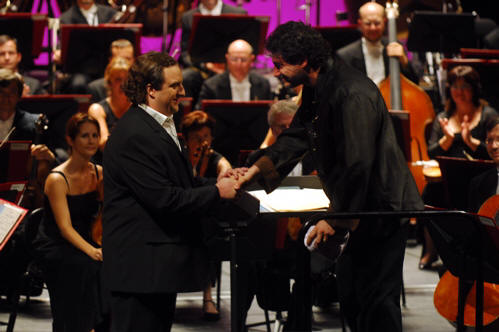
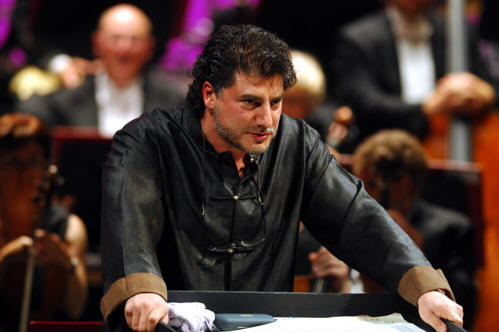
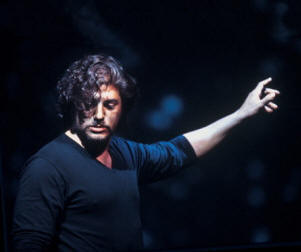
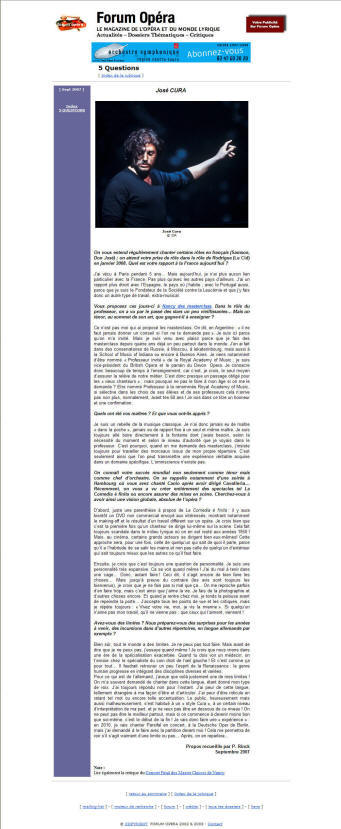
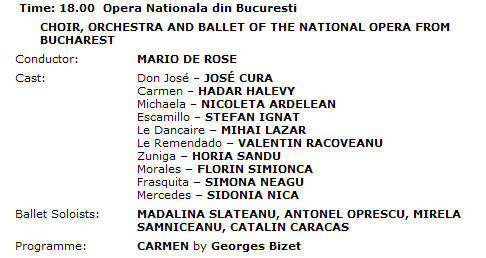

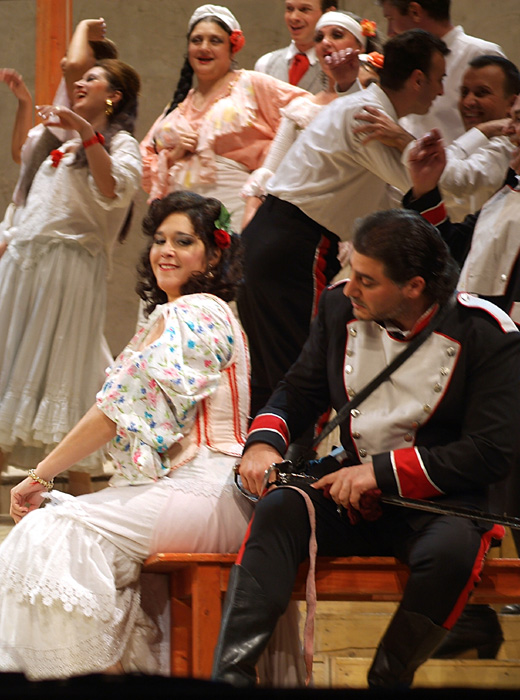
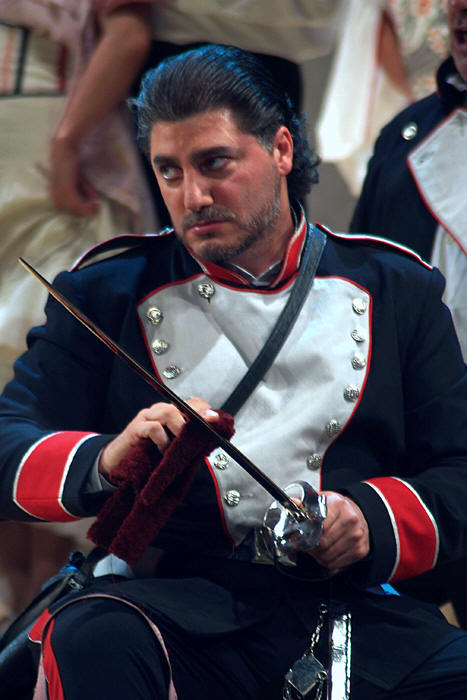
%20Sept%209%202007).jpg)
.jpg)
%20Sept%209%202007).jpg)





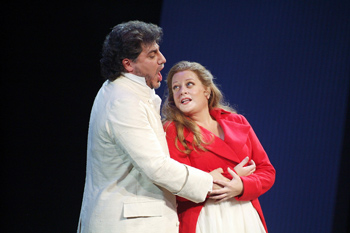


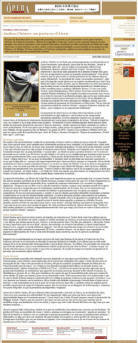

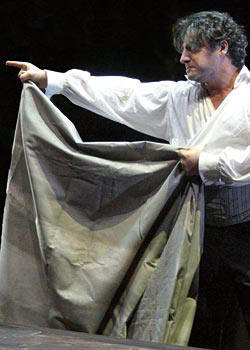
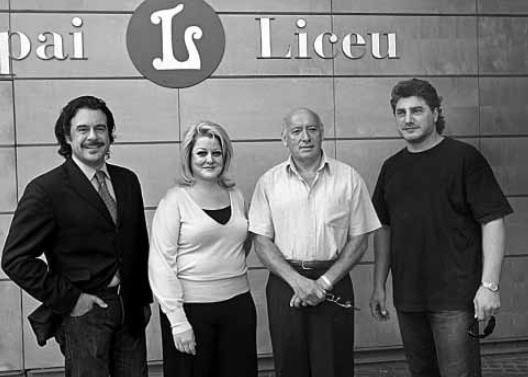



 He
has two loves: the baton and the voice. Two forms of expression of the
same personality. José Cura says that he used to want to be a maestro, but
had to sing to sustain his family. Now it is not quite so true: the
Maestro José also sustains the family, and Cura did not stop being a tenor.
Today, in the Teatro San Carlos in Lisbon, he will sing some arias from
opera but the main course of the evening is the 9th Symphony of
Beethoven, conducted by this artist in search of joy. The same work, the 9th,
the most emblematic of the ‘genius,’ as the maestro without fear states.
He
has two loves: the baton and the voice. Two forms of expression of the
same personality. José Cura says that he used to want to be a maestro, but
had to sing to sustain his family. Now it is not quite so true: the
Maestro José also sustains the family, and Cura did not stop being a tenor.
Today, in the Teatro San Carlos in Lisbon, he will sing some arias from
opera but the main course of the evening is the 9th Symphony of
Beethoven, conducted by this artist in search of joy. The same work, the 9th,
the most emblematic of the ‘genius,’ as the maestro without fear states.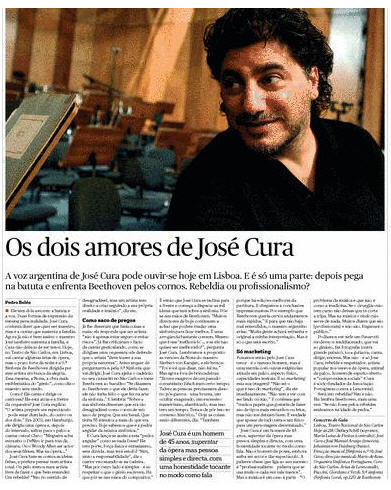
%20logo.jpg)
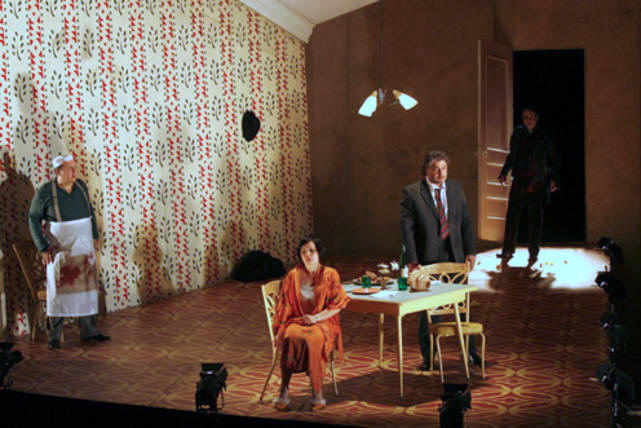

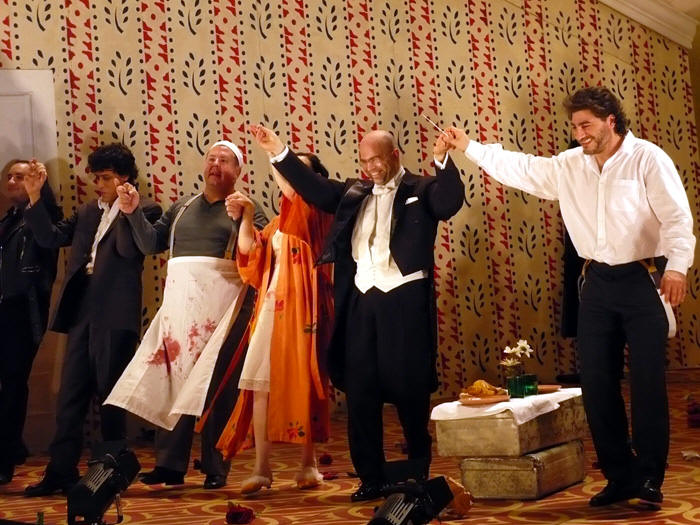

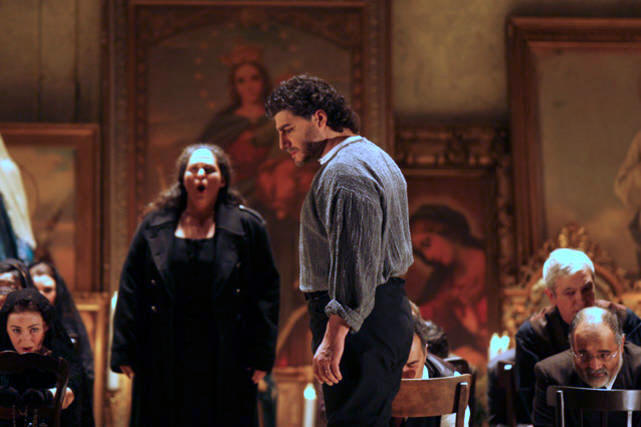
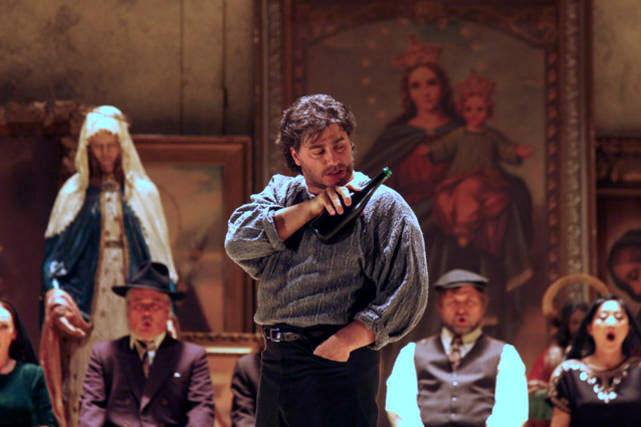

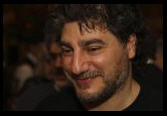 There
are tenors and TENORS. With tenor we refer to a singer, whereas TENOR refers
to a way of life. TENORS play on an audience, not to them. They mould the
music, they work their way towards that one high note and hold it for as
long as possible. All this is accomplished with the unconditional approval
of the audience that wishes for nothing but the unabashed TENOR attitude.
And exactly this is what the Eindhoven audience got last weekend. With José
Cura – ranking with Pavarotti, but in better shape and with less ado around
his person. (Eindhovens Dagblad 5 November 2007)
There
are tenors and TENORS. With tenor we refer to a singer, whereas TENOR refers
to a way of life. TENORS play on an audience, not to them. They mould the
music, they work their way towards that one high note and hold it for as
long as possible. All this is accomplished with the unconditional approval
of the audience that wishes for nothing but the unabashed TENOR attitude.
And exactly this is what the Eindhoven audience got last weekend. With José
Cura – ranking with Pavarotti, but in better shape and with less ado around
his person. (Eindhovens Dagblad 5 November 2007)


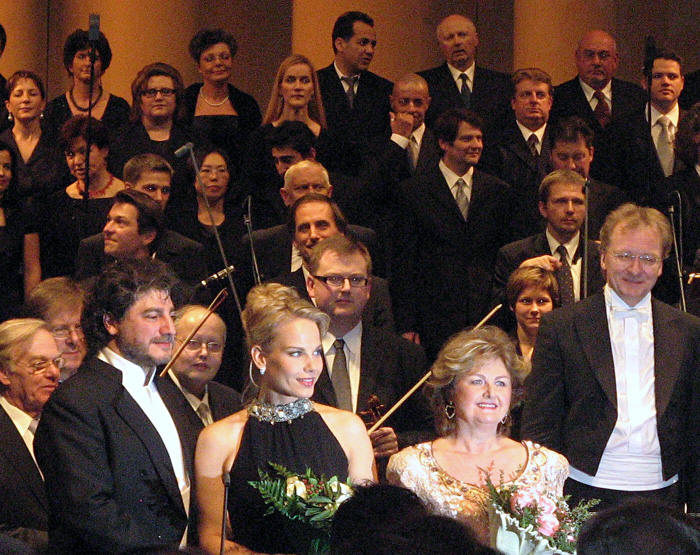
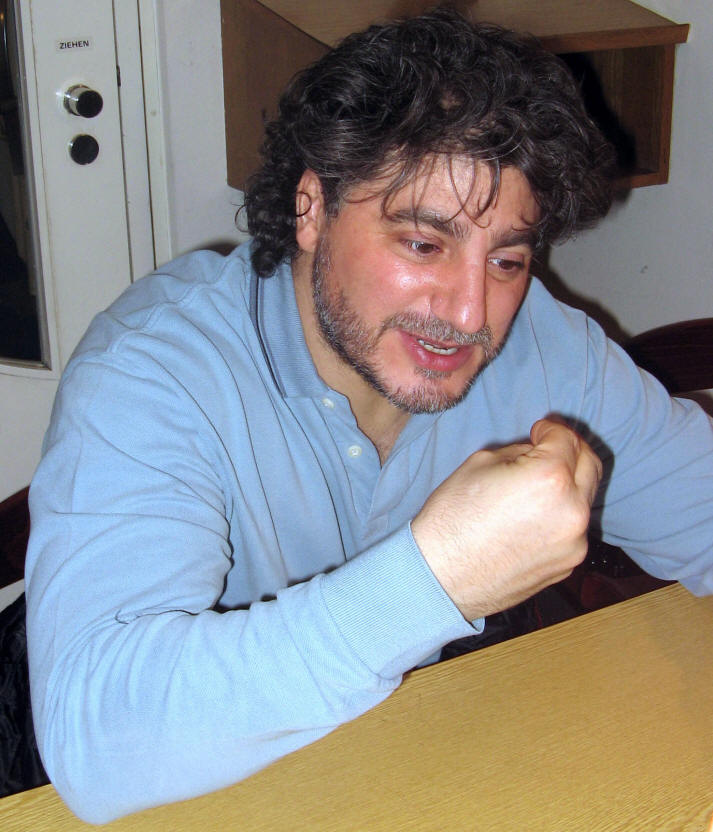

 STANDARD:
Mr. Cura, you have different approaches to music. You have studied piano and
composition, started conducting at 15 and only much later began to sing. Is
it sometimes difficult to switch between these approaches?
STANDARD:
Mr. Cura, you have different approaches to music. You have studied piano and
composition, started conducting at 15 and only much later began to sing. Is
it sometimes difficult to switch between these approaches? 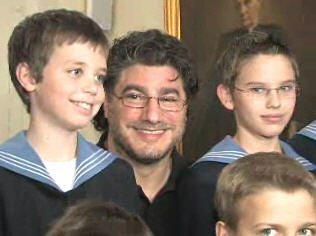 STANDARD:
Entertainment as an art, not only for the elite?
STANDARD:
Entertainment as an art, not only for the elite?